Discover a world of knowledge at your fingertips with Wray Castle's featured on-demand courses. Perfect for busy professionals looking to upskill or refresh their expertise, these courses offer the flexibility to learn at your own pace, anytime and anywhere.
Our on-demand courses cover a wide range of topics, from the latest advancements in 5G technology to the fundamentals of LTE and IP networks. Whether you're a seasoned telecoms professional looking to stay ahead of the curve or a newcomer to the industry eager to build a solid foundation, our curated selection of courses has something for everyone.
With Wray Castle's on-demand courses, you can access high-quality training developed by industry experts with decades of experience. Our courses are designed to be engaging and informative, with interactive elements to enhance your learning experience. You'll have the opportunity to dive deep into complex topics, explore real-world case studies, and test your knowledge with quizzes and assessments.
One of the key benefits of our on-demand courses is the ability to tailor your learning experience to suit your needs. Whether you have a few spare minutes during your lunch break or a whole weekend to dedicate to your professional development, you can access our courses whenever it's convenient for you. Plus, with lifetime access to course materials, you can revisit key concepts and refresh your knowledge whenever you need to.
At Wray Castle, we understand the importance of staying current in a fast-paced industry like telecommunications. That's why our on-demand courses are regularly updated to reflect the latest trends and developments in the field. By enrolling in our featured on-demand courses, you can be confident that you're receiving the most up-to-date training available.
Take your career to the next level with Wray Castle's featured on-demand courses. Start learning today and unlock new opportunities in the exciting world of telecommunications and technology.
Featured On-Demand Courses
-
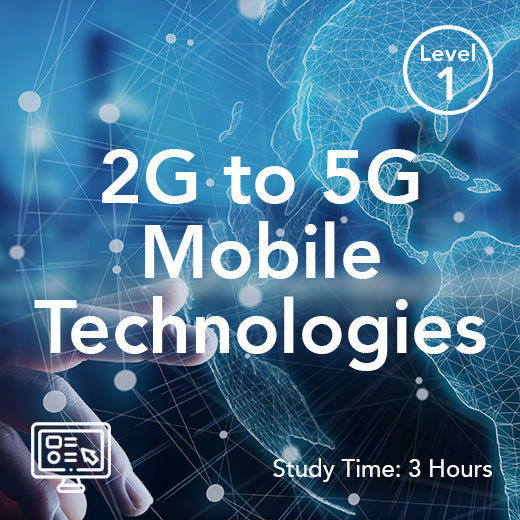
2G to 5G Mobile Technologies (On-Demand)
Our 2G to 5G Mobile Technologies Training Course is designed to provide professionals in the telecommunications industry with the knowledge and skills needed to understand and work with the latest mobile technologies. With the rapid evolution of mobile networks, staying up-to-date with the latest advancements is crucial for professionals looking to advance their careers in this field. Our comprehensive course covers everything from the basics of 2G technology to the cutting-edge developments in 5G networks.By enrolling in our training course, participants will gain a deep understanding of the principles and technologies behind 2G, 3G, 4G, and 5G networks. They will learn about the key features and capabilities of each generation, as well as the challenges and opportunities presented by the transition to 5G. Our expert instructors will guide participants through hands-on exercises and real-world case studies to ensure they have the practical skills needed to succeed in this dynamic industry.Whether you are a seasoned professional looking to upgrade your skills or a newcomer to the telecommunications field, our 2G to 5G Mobile Technologies Training Course will provide you with the knowledge and expertise needed to excel in this fast-paced industry. Stay ahead of the curve and advance your career with our industry-leading training program. This self-paced on-demand distance learning course features illustrated course books, videos, tests and full tutor support. Who would benefit This course is suitable for engineering, technical sales, technical management and other staff who require a general technical overview of mobile technologies but who do not need to invest the time necessary to learn about each technology in depth. Prerequisites A basic understanding of telecoms principles would be beneficial. Topic Areas Include: An overview of basic radio and cellular techniques and technologies Network Generations from 2G to 5G 3GPP Release programme An overview of 2G (GSM) network architecture and functionality GSM TDMA air interface operating principles GPRS and EDGE upgrades to GSM GSM services TETRA networks An overview of 3G (UMTS) network architecture and functionality UMTS WCDMA air interface operating principles HSPA and HSPA+ upgrades to UMTS An overview of 4G (LTE) network architecture and functionality LTE OFDMA air interface operating principles Evolved Packet Core (EPC) operation Small cells and heterogeneous networks Self Organising Networks (SON) LTE voice options LTE Advanced and LTE Advanced Pro Wi-Fi/Cellular interworking LTE operation in unlicensed frequency bands Machine Type Communications (MTC) LTE for public safety Introduction to 5G 3GPP use cases for 5G Performance targets for 5G Radio Spectrum for 5G 5G OFDMA air interface 5G System Architecture Non Standalone (NSA) and Standalone (SA) New Radio (NR) 5G Core Network Functions
£750.00
-

5G Advanced (On-Demand)
5G Advanced On-Demand is a comprehensive course designed to explore the latest advancements in 5G technology, specifically focusing on the enhancements introduced in 3GPP Release 18. This course delves into how 5G Advanced significantly boosts network capabilities, paving the way for future demands and innovations in the telecommunications industry. By understanding the specific features and improvements that 5G Advanced brings to the table, telecom professionals, network engineers, product managers, and individuals involved in strategic planning or technical implementation can stay ahead of the curve and leverage these advancements to drive success in their respective industries. With a concise overview of the enhancements introduced by 5G Advanced, participants will gain valuable insights into how these improvements can revolutionize their current practices and infrastructure. From base capability improvements to specific features unique to 5G Advanced, this course covers a wide range of topics essential for professionals looking to stay informed and competitive in the rapidly evolving telecommunications landscape. Whether you are looking to enhance your technical knowledge or gain a strategic edge in your industry, 5G Advanced On-Demand offers the knowledge and expertise needed to thrive in the era of advanced connectivity and communication technologies. Who Would Benefit This course is ideal for telecom professionals, network engineers, product managers, and anyone involved in strategic planning or technical implementation within telecommunications and related industries who require a concise overview of the improvements 5G Advanced introduces, along with an examination of the specific features and how they enhance their respective industries. Course Contents Introduction 5G Advanced – Base Capability Improvements Specific 5G Advanced Features
£95.00
-
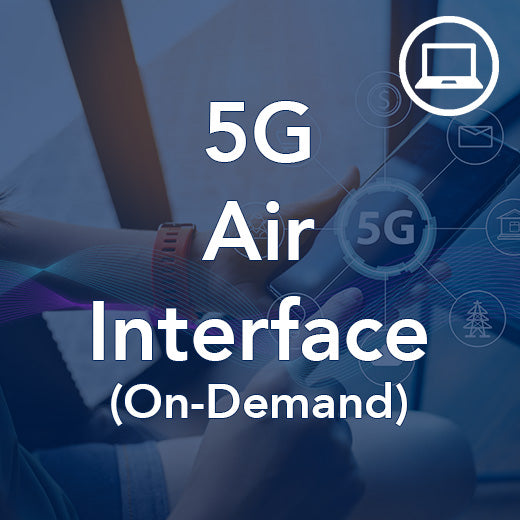
5G Air Interface (On-Demand)
Our 5G Air Interface training course provides a comprehensive technical overview of the air interface for the 5G New Radio (5G NR). This course delves into the principles of millimetre wave and multiple antenna communications, the architecture and implementation of the air interface's physical layer, as well as the higher layer air interface protocols and signalling procedures for both idle and active 5G devices. Ideal for engineers and professionals involved in equipment design, operation, optimization, or monitoring on the 5G air interface, this course assumes an engineering background with some knowledge of general radio principles and digital radio systems. While a basic understanding of 5G and experience with LTE radio systems are desirable, they are not mandatory prerequisites.In addition our course covers a range of topic areas including 5G introduction, use cases, and standardization, radio spectrum and millimetre wave communications, principles and implementation of multiple antennas in 5G, and more. For those looking to deepen their understanding further, we also offer an optional 5G Virtual Lab Module where participants can explore, test, optimize, and troubleshoot the 5G system in a fully emulated environment. This self-paced on-demand distance learning course features illustrated course books, videos, tests and full tutor support. Who would benefit The course is intended for engineers and other staff who are involved with equipment design, operation, optimization or monitoring on the 5G air interface. Prerequisites An engineering background with some knowledge of general radio principles and digital radio systems is assumed. A basic understanding of 5G and experience of LTE radio systems would be desirable. Topic Areas Include: 5G introduction, use cases and standardisation Radio spectrum and millimetre wave communications Principles and implementation of multiple antennas in 5G Architecture of the air interface physical layer Details and implementation of the 5G physical, transport and logical channels Air interface procedures for synchronisation, scheduling, data transmission, feedback and random access Dual connectivity architecture and protocol stacks Also available as a Live Online Training Programme, learn more.
£1,815.00
-

5G Air Interface - Technical Overview (On-Demand)
The 5G New Radio (NR) air interface lies at the heart of 5G’s transformative capabilities, enabling high data rates, low latency, and the flexibility to support a wide range of services - from enhanced mobile broadband to ultra-reliable low-latency communications and massive IoT. Unlike previous generations, 5G NR has been designed from the ground up without the constraint of backward compatibility, freeing it to address the diverse and demanding requirements of next-generation mobile networks. This course offers a technical deep dive into the architecture and operation of the 5G air interface. It explores how key design decisions - such as the adoption of flexible OFDMA, use of millimetre wave frequencies, large-scale antenna arrays, and adaptable subcarrier spacing - combine to deliver major improvements in spectral and energy efficiency. You'll also learn how 5G NR accommodates a wide variety of use cases through its advanced protocol stack, modulation schemes, duplexing methods, and dynamic bandwidth configurations. By the end of the course, participants will understand the principles behind 5G NR’s physical layer, its use of spectrum (including FR1 and FR2 bands), and the challenges and opportunities associated with operating at high radio frequencies. Whether you're a telecom engineer, network architect, or systems analyst, this course provides the foundational knowledge needed to work confidently with the 5G air interface. Course Contents 5G Objective and Performance Requirements Air Interface Protocol Stack Wireless Capacity Growth 5G Spectrum Overview TDD and FDD Overview Millimeter Wave and Antenna Overview mmWave Propagation Characteristics Capacity and Modulation Principles of Orthogonal Frequency Division Multiple Access (OFDMA) Inter-Symbol-Interference Bandwidth Parts Time Domain Structure PHY Resource Grid Physical Channels and Signals
£95.00
-
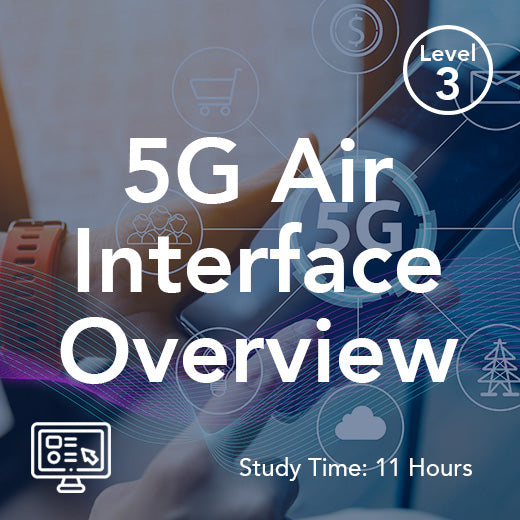
5G Air Interface Overview (On-Demand)
This 5G Air Interface Overview training course provides a technical introduction to the 5G New Radio. Participants will gain insight into the design goals, development schedule, principles, design, and implementation of the 5G air interface. Engineers who are new to or already working in mobile radio communications will benefit from this course, which assumes familiarity with telecommunications and general engineering terminology. Some understanding of LTE cellular systems would also be beneficial for attendees. During this course participants will delve into various topic areas related to 5G, including key features and standardization, use cases, performance objectives, deployment options, radio spectrum, millimeter-wave communications, principles of radio transmission and reception, multiple antennas, air interface protocol stack, architecture of the air interface physical layer, and procedures for data transmission and reception on the 5G air interface. This self-paced on-demand distance learning course features illustrated course books, videos, tests and full tutor support. Who would benefit This course is intended for engineers either new to, or already working in, mobile radio communications. Prerequisites Familiarity with telecommunications and general engineering terminology is assumed. Some understanding of LTE cellular systems would be beneficial. Topic Areas Include: 5G introduction, key features and standardisation Use cases and performance objectives Non-standalone and standalone deployment options Radio spectrum and millimetre wave communications Principles of radio transmission and reception in 5G Multiple antennas in 5G Air interface protocol stack Architecture of the air interface physical layer Procedures for data transmission and reception on the 5G air interface.
£500.00
-
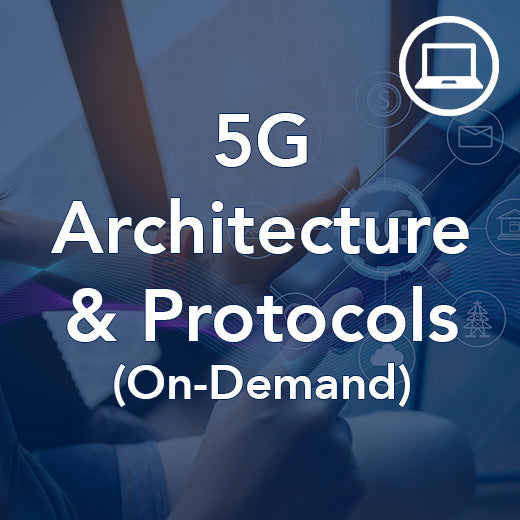
5G Architecture and Protocols (On-Demand)
This 5G Architecture and Protocols on-demand course is a detailed technical description of the core and radio access networks of 5G. It covers the architecture and interfaces used by 5G, the protocols used for signalling and data transport, the provision of services over a 5G network, and the procedures for signalling and system operation. This self-paced on-demand distance learning course features illustrated course books, videos, tests and full tutor support. Who would benefit The course is intended for engineers and other staff who are involved with the architecture, optimization, management, monitoring or testing of the 5G network. Prerequisites An engineering background with some knowledge of core and radio access network technologies is assumed. A basic understanding of 5G and experience of LTE networks would be desirable. Topic Areas Include: 5G introduction, use cases and standardisation Radio access network architecture and deployment options Network architectures for dual connectivity Architecture of the 5G core network Network Function virtualisation, slicing and orchestration Interworking and compatibility between 5G, LTE and Wi-Fi PDU connectivity, Quality of Service and service provision Control plane and user plane protocols in the 5G network Implementation of network function services using HTTP/2 Signalling procedures for registration, security and session management Network operation in Idle, Inactive and Connected modes
£1,815.00
-
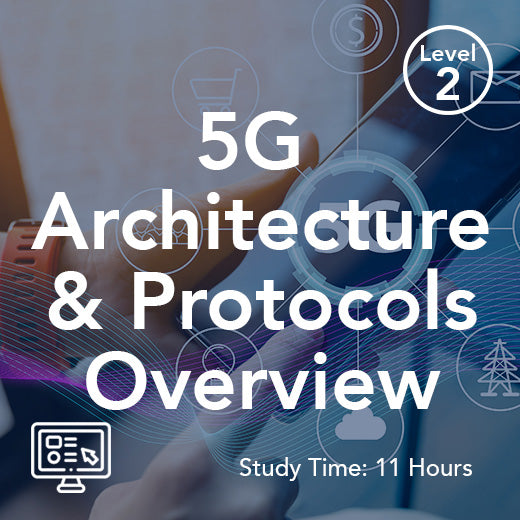
5G Architecture and Protocols Overview (On-Demand)
This 5G Architecture and Protocols Overview on-demand training course provides a comprehensive technical introduction to the 5G network, covering design goals, development schedules, and the core and radio access networks of 5G. Engineers new to or already working in mobile communication networks will benefit from this course, which assumes familiarity with telecommunications and general engineering terminology, with some understanding of LTE cellular systems being beneficial. The course covers a range of topic areas, including 5G introduction, key features, and standardization, use cases and performance objectives, radio access network architecture and protocols, core network architecture and protocols, network function virtualization, network slicing, interworking and compatibility between 5G, LTE, and Wi-Fi, PDU connectivity, Quality of Service, service provision, and signaling procedures in the 5G network. This self-paced on-demand distance learning course features illustrated course books, videos, tests and full tutor support. Who would benefit This course is intended for engineers either new to, or already working in, mobile communication networks. Prerequisites Familiarity with telecommunications and general engineering terminology is assumed. Some understanding of LTE cellular systems would be beneficial. Topic Areas Include: 5G introduction, key features and standardisation Use cases and performance objectives Radio access network architecture and protocols Non standalone and standalone deployment options Core network architecture and protocols Network function virtualisation and network slicing Interworking and compatibility between 5G, LTE and Wi-Fi PDU connectivity, Quality of Service and service provision Signalling procedures in the 5G network
£500.00
-
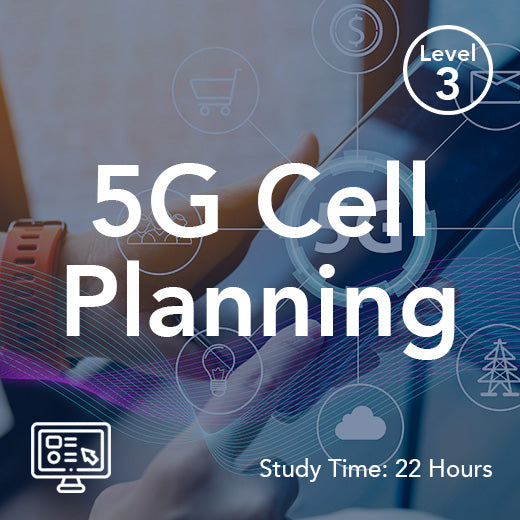
5G Cell Planning (On-Demand)
Our 5G Cell Planning training course is designed to provide network planning engineers with the essential knowledge and skills needed to effectively plan radio access networks for 5G. Through practical worked examples and in-depth discussions, participants will gain a solid understanding of coverage and capacity estimations, RF KPIs, signal measurements, and parameters that impact the random access process. By the end of the course, students will be equipped with the theoretical knowledge and practical tools to confidently plan 5G cells and optimize network performance. Whether you are new to 5G cell planning or looking to enhance your existing skills, this training programme is suitable for anyone with a background in telecommunication systems and radio network planning. Join us and take your 5G cell planning expertise to the next level. Don't miss out on the opportunity to advance your career in 5G cell planning. Enroll in our live online training course today and gain valuable insights into the fundamentals of the 5G air interface, link budget estimation, coverage estimation, capacity estimation, and more. For a self-paced learning option, check out our On-Demand Training Programme and start mastering 5G cell planning at your own pace. This self-paced on-demand distance learning course features illustrated course books, videos, tests and full tutor support. Who Would Benefit This course is intended for network planning engineers, who wish to learn about the issues that are involved when planning radio access networks for 5G. Prerequisites The course assumes familiarity with telecommunication systems and with the principles of radio network planning. Some understanding of radio network planning for LTE, and of the 5G air interface, would be beneficial. Topic Areas Include Fundamentals of the 5G Air Interface Link Budget Estimation Coverage Estimation Fundamentals of the 5G Air Interface Link Budget Estimation Coverage Estimation
£750.00
-
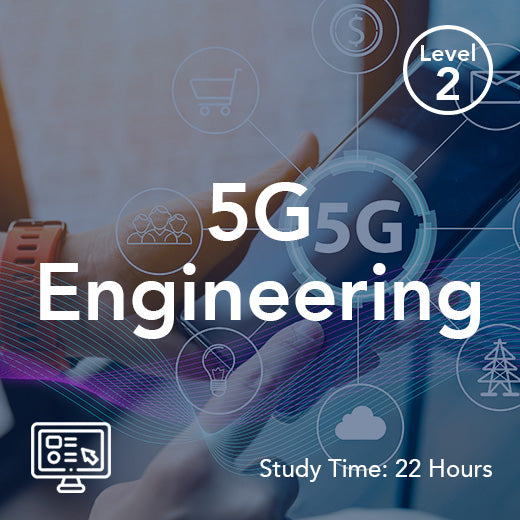
5G Engineering (On-Demand)
This 5G Engineering on-demand training course is designed to provide a comprehensive technical introduction to 5G technology. The course covers the design goals, development schedule, principles, design, and implementation of the 5G air interface, radio access network, and core network. Participants will gain a deep understanding of the operation of the 5G system through illustrated course books, videos, tests, and full tutor support. Engineers who are new to the field of mobile communications or those already working in the industry can benefit greatly from this course. Familiarity with telecommunications and general engineering terminology is assumed, and some understanding of LTE cellular systems would be beneficial for participants looking to get the most out of this training. By enrolling in this course, participants will delve into key topics such as 5G introduction, use cases, air interface principles, radio access network architecture, core network protocols, network function virtualisation, interworking between 5G, LTE, and Wi-Fi, and much more. With a total duration of 22 hours, this on-demand training course offers a flexible and convenient way to enhance your knowledge and skills in the rapidly evolving field of 5G technology. Who would benefit This course is intended for engineers either new to, or already working in, mobile communications. Prerequisites Familiarity with telecommunications and general engineering terminology is assumed. Some understanding of LTE cellular systems would be beneficial. Topic Areas Include 5G introduction, key features and standardisation Use cases and performance objectives Principles of the air interface: radio spectrum, OFDMA and multiple antennas Air interface protocol stack Architecture of the air interface physical layer Procedures for data transmission and reception on the 5G air interface Radio access network architecture and protocols Non-standalone and standalone deployment options Core network architecture and protocols Network function virtualisation and network slicing Interworking and compatibility between 5G, LTE and Wi-Fi PDU connectivity, Quality of Service and service provision Signalling procedures in the 5G network
£1,815.00
-
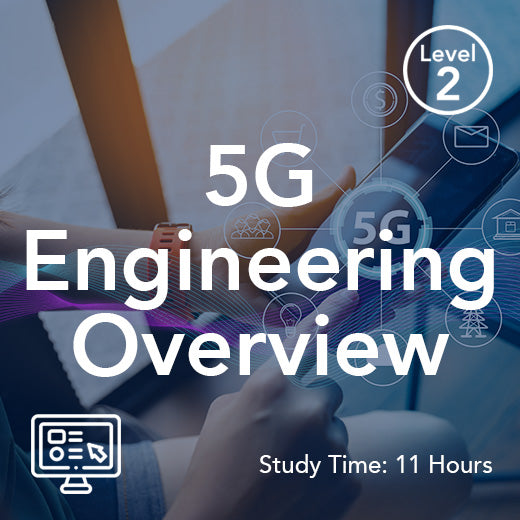
5G Engineering Overview (On-Demand)
This 5G Engineering Overview course is a technical overview of 5G. The course includes the design goals and development schedule for 5G, and the principles and architecture of the 5G air interface, radio access network and core network. This 5G Engineering Overview training course provides a comprehensive technical overview of 5G, including its design goals, development schedule, and the principles and architecture of the 5G air interface, radio access network, and core network. Engineers new to or already working in mobile communications will benefit from this course, gaining valuable insights into the latest advancements in 5G technology. Participants in this course are assumed to have familiarity with general engineering and telecommunications terminology, with some understanding of LTE cellular systems being beneficial. The course covers a range of topic areas, including 5G introduction and key features, standardization and timelines for 3GPP and the ITU, use cases and performance objectives, radio spectrum and millimeter wave communications, principles of radio transmission and reception in 5G, radio access network architecture, non-standalone and standalone deployment options, core network architecture, network function virtualization and network slicing, and interworking and compatibility between 5G, LTE, and Wi-Fi. Overall, this 5G Engineering Overview training course offers a valuable opportunity for engineers to deepen their understanding of 5G technology and its implications for mobile communications. This self-paced on-demand distance learning course features illustrated course books, videos, tests and full tutor support. Who would benefit This course is intended for engineers either new to, or already working in, mobile communications. Prerequisites Familiarity with telecommunications and general engineering terminology is assumed. Some understanding of LTE cellular systems would be beneficial. Topic Areas Include 5G introduction and key features Standardisation and timelines for 3GPP and the ITU Use cases and performance objectives Radio spectrum and millimetre wave communications Principles of radio transmission and reception in 5G Radio access network architecture Non standalone and standalone deployment options Core network architecture Network function virtualisation and network slicing Interworking and compatibility between 5G, LTE and Wi-Fi
£500.00
-

5G NG-RAN Signalling Procedures (On-Demand)
Mobility and state management are at the heart of delivering seamless connectivity in 5G networks. This short, single-module course provides a technical overview of how the 5G Next Generation Radio Access Network (NG-RAN) manages UE mobility and RRC state transitions through signalling interactions. In just three hours, you'll explore how devices move between key RRC states - RRC_IDLE, RRC_INACTIVE, and RRC_CONNECTED - and how signalling flows coordinate these transitions between the UE, gNBs, and core network functions such as the AMF, SMF, and UPF. The course covers a range of mobility procedures, including intra- and inter-gNB handovers, with a focus on signalling, context management, and data forwarding. You'll also learn how dual connectivity is managed, including the addition and release of secondary nodes. Designed for technical professionals who need a solid introduction to how 5G NG-RAN handles mobility and signalling, this course equips you with the essential knowledge required to understand and troubleshoot mobility-related behaviour in live 5G networks. Course Contents Idle Mode RRC Connected Mode RRC Inactive Mode RRC Connected Additional Handovers Secondary Nodes Final Transitions
£95.00
-
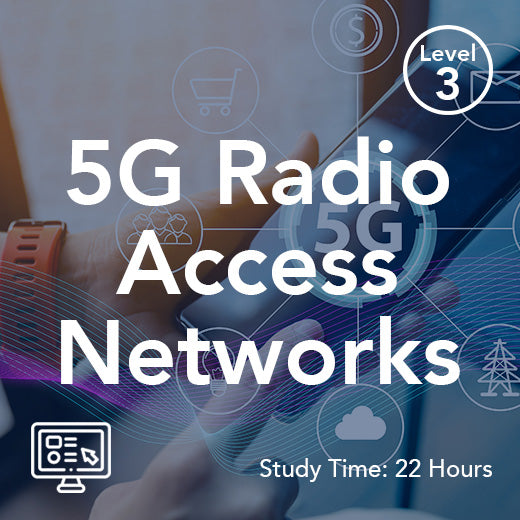
5G Radio Access Network (On-Demand)
Our 5G Radio Access Network training course is designed to provide professionals in the telecommunications industry with the knowledge and skills needed to effectively design, deploy, and manage 5G networks. In this course, participants will learn about the key concepts and technologies behind 5G RAN, including massive MIMO, beamforming, and network slicing. Our expert trainers will guide you through hands-on exercises and real-world case studies to help you gain practical experience in implementing 5G RAN solutions. By enrolling in our 5G RAN training course, you will be equipped with the latest industry insights and best practices to stay ahead in the rapidly evolving telecommunications landscape. Whether you are a network engineer, system architect, or project manager, this course will provide you with the tools and expertise needed to drive successful 5G RAN deployments. Join us at Wray Castle and take your career to the next level with our comprehensive 5G Radio Access Network training course. This self-paced on-demand distance learning course features illustrated course books, videos, tests and full tutor support. Who Would Benefit Engineers that need to know about the 5G Radio Access Network in terms of its characteristics, architecture, interfaces and operation Prerequisites Ideally students will have a mobile telecommunications or radio background gained from the study of or working with GSM, UMTS or LTE networks. Topic Areas Include Introduction to 5G 5G RAN NG Interface Messages and Procedures Xn Interface Messages and Procedures E1 Interface Messages and Procedures F1 Interface Messages and Procedures Multi-RAT Dual Cennectivity
£750.00
-

5G RAN Architecture and Features (On-Demand)
As 5G networks continue to expand and evolve, a solid understanding of the 5G Radio Access Network (RAN) is essential for those involved in mobile network planning, deployment, or operations. This short, single-module course provides a focused overview of the 5G RAN architecture and the key features that distinguish it from previous generations. In just three hours, you'll explore the structure of the 5G RAN, including the role of the gNB (Next Generation Node B) and its functional split into Centralised Units (CUs) and Distributed Units (DUs). The course explains the key interfaces - NG, Xn, F1, and E1 - that enable communication between RAN components, other base stations, and the core network. You'll also gain insight into different deployment scenarios such as Dual Connectivity (DC) and Multi-RAT Dual Connectivity (MR-DC), which allow 5G to coexist and coordinate with legacy networks. Additionally, the course covers the evolution of the fronthaul interface from CPRI to eCPRI, the importance of backhaul capacity, and the need for precise timing and synchronisation in high-performance 5G networks. Designed for technical professionals needing a clear and accessible introduction to 5G RAN architecture, this course delivers the essential concepts required to understand and engage with today’s 5G radio access technologies. Course Contents 5G RAN Overview Dual Connectivity (DC) 5G non-Standalone and Standalone Options RAN Options EN-DC NGEN-DC and NE-DC RAN User Plane Connectivity RAN Control Plane Connectivity gNB Architecture Centralized and Distributed Deployments Common Public Radio Interface (CPRI) and eCPRI Fronthaul and Backhaul Requirements Synchronisation Requirements
£95.00
-
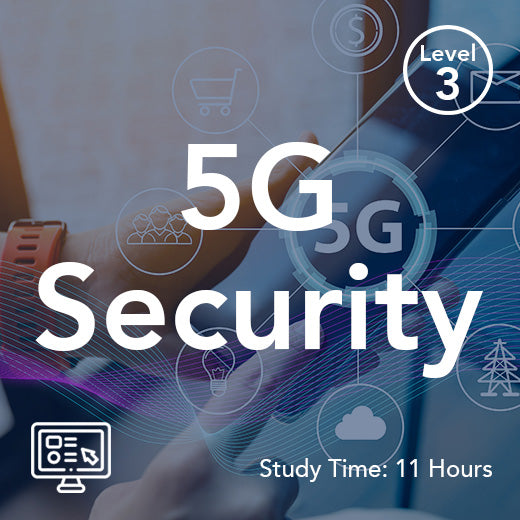
5G Security (On-Demand)
The nature of 5G means that the security architecture and processes need to cover new aspects (when compared to previous 3GPP generations), including 5GNR/LTE Dual Connectivity, standardized interfaces for distributed gNB / RAN architectures, more tightly integrated Non-3GPP Access, and most significantly, the new Service Based Interfaces used within the 5G Core. The 5G Security on-demand course provides a comprehensive grounding in this expanded set of security requirements and mechanisms used in 5G. We start by considering the 5G architecture in order to better understand the overall security requirements for both the UE and network. We then build on the security architecture of 4G LTE, with relevant modifications and additions required for 5G, before focusing squarely on the additional features and procedures required to secure the 5G Core Network (Service Based Interface). This self-paced on-demand distance learning course features illustrated course books, videos, tests and full tutor support. Who would benefit This course is designed for engineers, managers and other personnel who have a need to acquire a technical overview of the security environment employed within 5G networks. It will also be of benefit to those in the wider technical community who have a need to understand the security protocols employed by advanced cellular networks. Prerequisites An understanding of 4G (and legacy 2G and 3G) security procedures would be an advantage as would a basic understanding of 5G and / or LTE network architecture and functionality. Topic Areas Include 5G Architecture and the Service Based Interface 5G Security Architecture and Authentication and Key Agreement Security and the Service Based Interface (including SEPP)
£500.00
-
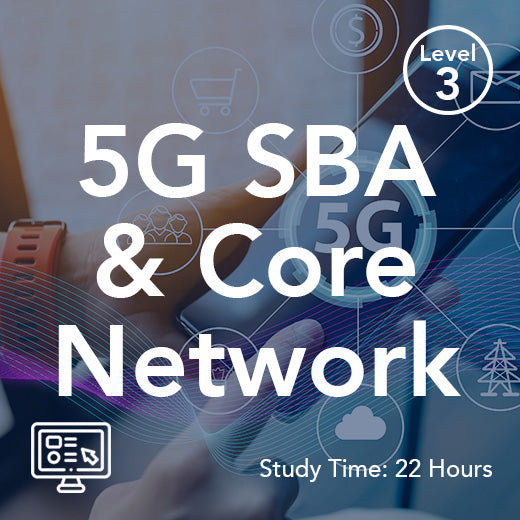
5G Service Based Architecture and Core Network (On-Demand)
Our 5G Service Based Architecture and Core Network Training Course is designed to provide a comprehensive understanding of core network functions within the SBA, as well as the protocols and technologies that support the 5G Core. Through example procedures and in-depth exploration of the Service Based Interface (SBI) and Service APIs, participants will gain valuable insights into key 5G enabling principles such as virtualization and network slicing. Additionally, the course covers security on the SBI, introducing new network functions and techniques that enhance the security features of the core network domain. Ideal for professionals involved in the design, deployment, and development of 5G Service Based Architecture and the 5G Core, this technical course requires some prior knowledge or experience with the 5G system from a technical perspective. Topics covered include 5G introduction and deployment options, core network functions, supporting protocols and technologies, SBI security, and more. Participants will benefit from live online sessions led by industry experts, providing a dynamic and interactive learning experience. For those looking to explore, test, optimize, and troubleshoot the 5G system beyond the theoretical, we also offer an optional 5G Virtual Lab Module. This fully emulated environment allows participants to experiment with configurations for Network Functions and customize settings for signaling scenarios, providing a hands-on approach to developing a deeper understanding of the operation of the 5G system. This self-paced on-demand distance learning course features illustrated course books, videos, tests and full tutor support. Who would benefit This course is designed for those involved in the design, deployment and development of the 5G Service Based Architecture and the 5G Core. Prerequisites This is a technical course, so experience or knowledge of the 5G system from a technical perspective would be an advantage. Topic Areas Include 5G Introduction and Deployment Options The 5G Core Network Functions 5G Core Supporting Protocols and Technologies The Service Based Interface (SBI) and Service APIs Explained Procedures Deployment options SBI Security
£750.00
-

5G Signalling Procedures - Technical Overview (On-Demand)
As 5G networks mature, a solid grasp of the procedures that govern how devices and network functions interact is essential for professionals working in planning, operations, or optimisation. This short course offers a technical overview of the core signalling and operational procedures in 5G Standalone (SA) networks. In just three hours, you'll explore how 5G procedures have evolved - from initial deployments that relied on LTE signalling to fully native 5G implementations across both the core and radio access network. The course covers the step-by-step processes involved in device registration, network function discovery, and session establishment and modification. You'll also gain insight into mobility management procedures, including how 5G handles transitions between different UE states - idle, connected, and inactive - and how it manages tasks like cell selection, registration updates, service requests, and handovers. The role of the Radio Resource Control (RRC) protocol in managing radio connections, reporting measurements, and supporting dual connectivity scenarios is also explained. This course is designed to provide technical professionals with a foundational understanding of how 5G devices and networks interact through signalling and procedure flows, forming the basis for reliable service delivery in real-world deployments. Course Contents 5G Procedures NF Service Registration, Discovery, Subscription and Notification Power-on Procedures Registration Procedure PDU Session Establishment Server-triggered PDU Session Modification and QoS Flow Establishment Change of PDU Session Anchor Mobility Management and Registration Update UE Triggered Service Request Procedure RNA Update and RRC Transitions Xn-based Handover Procedure Addition of a Secondary Node Access Network Release Procedure Signalling Procedures RRC Signalling Overview NSA and SA RRC Reconfiguration Message Overview RRC Measurements Procedures MR-DC Procedures
£95.00
-

5G Standalone - Core Network Architecture (On-Demand)
As mobile networks transition to full 5G Standalone deployments, understanding the 5G Core (5GC) is essential for engineers and technical professionals involved in network design, deployment, or support. This single-module course offers a concise but comprehensive introduction to the 5G Core Network Architecture. In just three hours, you’ll explore the key building blocks of the 5G Core, including the main network functions such as the UDM, AMF, SMF, and UPF, and their roles in managing subscriber data, mobility, sessions, and user traffic. The module also explains important network and UE identifiers, tracking area concepts, and the role of service-based interfaces in enabling 5G’s flexibility. You’ll gain insight into how 5G supports roaming, interworks with legacy EPC networks, and introduces network slicing—a powerful concept that allows the same physical network to support a wide variety of use cases with different performance requirements. This course is ideal for those who need a technical overview of the 5G Core without going deep into protocol-level detail, and serves as a foundation for further learning or practical application in 5G projects. Course Contents 5G Core Network Functions Overview Reference Point Architecture 5G Roaming Architectures Service Based Architecture Service Based Interface Concepts 5G Core Network Functions Data Storage Architecture Interworking and Migration Non-3GPP Access 5G Identities Identities for Network Slicing TAC and RAN Identites
£95.00
-

5G Standalone - Network Protocols (On-Demand)
Understanding the protocols that underpin 5G Standalone (SA) deployments is critical for anyone involved in mobile network design, deployment, or troubleshooting. This single-module course provides a practical overview of the key signalling and user plane protocols that enable communication within the 5G system. In just three hours, you'll explore how 5G SA uses modern service-based interfaces, with a focus on HTTP/2 and JSON for communication between core network functions. You'll also learn about protocol roles such as PFCP for user plane control, GTPv2-C for EPC interworking, and NAS protocols for direct signalling with the user equipment. The course also covers the essential signalling protocols in the NG-RAN, including NG-AP, Xn-AP, F1-AP, E1-AP, and RRC - critical for coordinating activity across the RAN and between the RAN and core. On the user plane, you’ll examine how data transport is managed using PDU sessions, and how session types (IP, Ethernet, Unstructured) are established and handled. You’ll also gain an understanding of QoS Flows, with parameters such as 5QI and ARP used to deliver differentiated service levels. This course is ideal for technical professionals who need a working knowledge of 5G SA protocol architecture, signalling behaviour, and data transport mechanisms - without going deep into packet-level analysis. Course Contents PDU Sessions and QoS Flows 5G QoS Parameters, ARP and 5QI Implementation of PDU Sessions IP PDU Session Types, IP Ethernet and Unstructured Multiple PDU Sessions Anchors Reflective QoS User Plane Protocol Stack Core Network Signalling Overview Hypertext Transfer Protocol (HTTP) HTTP 2 and JSON_2 Non-Access Stratum (NAS) and Access Stratum (AS) Protocols Next Generation Radio Access Network (NG-RAN) Signalling Protocols Overview RAN Protocols for the NG, FI, E1 and Xn Interfaces RAN User Plane Protocol
£95.00
-

5G Technologies, Services and Markets (On-Demand)
This 5G Technologies, Services and Markets on-demand course is a non-technical introduction to the 5G mobile communication system, including its capabilities, general structure and operation, as well as its position as a development of previous technologies. The course also covers the place that 5G holds in the telecommunications market, and how that is developing. This 1-day training course is designed to provide a comprehensive overview of 5G technologies, services, and markets. The course covers the basics of 5G mobile communication systems, including their capabilities, structure, and operation, as well as their evolution from previous technologies. Participants will also gain insights into the current landscape of the telecommunications market and the role that 5G plays in shaping its future. Ideal for non-technical professionals in the mobile or fixed telecommunications sector, this course requires no prior technical knowledge but some familiarity with the industry would be beneficial. Topics covered include an introduction to 5G, market drivers, use cases, performance objectives, key features, network architectures, voice services, industry players, standardization, and the relationship between 5G, LTE, and Wi-Fi. By enrolling in this course, participants will gain a solid understanding of 5G technologies and their impact on the telecommunications industry. Stay ahead of the curve and enhance your knowledge with this engaging and informative training opportunity. This self-paced on-demand distance learning course features illustrated course books, videos, tests and full tutor support. Who would benefit This course is intended for non-technical professionals either new to, or already working in, the mobile or fixed telecommunications sector. Prerequisites No technical knowledge is assumed but some familiarity with the telecommunications industry would be beneficial. Topic Areas Include Introduction to 5G Market drivers for 5G Use cases for 5G Performance objectives and spectrum requirements Concepts and key features of 5G Architecture of the core and radio access networks of 5G Voice services in 5G Key industry and market players Standardisation and timelines for 3GPP and the ITU 5G, LTE and Wi-Fi – a holistic approach
£95.00
-

5G – Standalone, Enablers for the Industry & Business Perspective (On-Demand)
With SA 5G, we witness the evolution of mobile networks, from being reliant on legacy infrastructure, to achieving true independence - and unlocking unprecedented capabilities that enables 5G to support a much wider range of industrial use cases. In this course, we guide you through the benefits and challenges of deploying Standalone 5G, exploring its architectural advancements, unique features, and the benefits it brings to both consumers and businesses. We then highlight the enhanced capabilities and expanded use cases made possible by key technology enablers - including network slicing, edge computing, virtualization, non-terrestrial networks (NTNs), network exposure, and network automation. We discuss the impact of 5G SA for network operators, service providers, and enterprises - exploring the opportunities and challenges that arise in the deployment and management of advanced 5G networks. Who Would Benefit Ideal for anyone needing clarity on 5G trajectory – including capabilities & use cases Prerequisites A basic appreciation of the telecoms landscape – both technical and business Course Contents 5G Base Capabilities A Business Perspective 5G Standalone (SA) 5G Enablers for Industry
£95.00
-

Basics of Carbon Capture and Storage (On-Demand)
The Basics of Carbon Capture and Storage course covers: the role of CCS within decarbonisation as an aspect of earth system science; why CCS is necessary; how CO2 is captured in industrial processes and how it can be used industrially; the factors affecting geological storage; how CO2 stores are monitored for leakage; how CCS will be regulated; how CCS will pay for itself; and the social licence for CCS. The course will be delivered in simple non-technical language suitable for non-specialists. The course satisfies a part of the market that is not currently catered for – the wider science, risks, financing, planning and social licence aspects of CCS. These are issues that are as important as the technical issues (in, for example, reservoir engineering) in the sense that any of these elements can be a show-stopper for CCS. Although the course will cover the technical geological and engineering aspects of CCS, it will also consider how these technical, policy and science aspects affect planning, regulation and financing of CCS. There are geologists, planners, investors and policy makers in companies, government natural resource and planning departments, investment banks and among NGOs that require this information from an unbiassed technically well informed and up to date source. This course provides that source.Who would benefit? The course is designed for geologists, geological planners and regulators, investors and policy makers in energy companies, government natural resource and planning departments, investment banks and NGOs that require information from an unbiassed, technically well informed and up to date source. What people need in advance No particular prior knowledge needed beyond normal levels of expertise in applied geoscience. As stated above, the course is aimed at geological generalists in energy companies, government natural resource and planning departments, investment banks and NGOs. Course Modules: Introduction The geological carbon cycle and anthropogenic influences on the geological carbon cycle Capturing, transporting and using carbon dioxide Geological Storage Regulation, finance, policy and public perception Present state of global CCS Course Director: Prof Mike Stephensen Mike has 25 years’ experience in energy and geological science, including 8 years national level science leadership in the UK. Mike has been providing geoscience advice to Government for almost 15 years and has an excellent overview of Government policy, industrial activity and funding landscape in applied and energy geoscience. Mike also has expertise in positioning organisations in controversial energy topics e.g. CCUS, shale gas and nuclear. Mike was adviser to UK Government Chief Scientist on shale gas and CCUS in 2016; a member UKRI’s Energy Strategic Advisory Committee 2020 to 2021; and a Member of the UK Government’s Hydrogen Advisory Council 2021. Widely recognised as an excellent scientist, he has over 100 peer-reviewed scientific papers including many on CCUS, and ~200 conference abstracts. He is Visiting Professor at the University of Nanjing, China, and the University of Milan, Italy, and has been Honorary Professor at Nottingham and Leicester universities, UK Mike is a well-known communicator of science and has published three single-author popular science books. His book on CCUS ‘Returning Carbon to Nature’ is widely seen as the go-to introductory text on CCUS. Follow Mike on LinkedIn.
£980.00
-

Business Finance – For Non-Financial Managers (On-Demand)
All successful employees, managers and leaders who want to maximise their contribution within the business or organisation need a solid grasp of finances. Whether they are talking strategy, budgets, or customer propositions, it is inevitably the finances that drive the decisions and determine how performance is measured. Being financially literate gives the individual a fundamental business tool, as well as the credibility, to help drive success and to maximise value creation. KPIs can be properly evaluated, major decisions can be grounded in financial reality, and both forecasting and reporting can be used more reliably to help guide efforts and provide the required focus for departments and teams. A key aspect often overlooked, is that greater confidence in both the financial position, and the control mechanisms that are available to employees and managers, will enhance a leader’s risk-awareness. In turn (depending on a range of other factors), this can be a key enabler for business culture that embraces greater levels of creativity and value creation. This programme provides a comprehensive foundation in business finance – covering all the major areas needed to be a fully-functioning member of the mid-senior management team. It is ideal for current or aspiring managers, specialists with financial responsibility, or identified talent / graduates. Although financial principles do not change, they can be applied in very specific ways, depending on the industry / organisation. Examples, case studies and exercises are tailored accordingly Topic Areas Include: The Financial Cycle and Reporting Key Accounting Concepts The Company Operating (Finance) Cycle Three Principal Accounting Documents KPIs, Ratios and Financial Analysis Understanding Finance Key Financial Ratios – Categories and Examples Profitability Efficiency Equity, Loans, and Gearing / Leverage Valuation - Controlling Investment Financial Control, Budgets and Evaluating Initiatives / Projects The Importance of Budgeting and Forecasting Budgets – Getting Specific Mitigating Bad Budget Culture (Teams Aiming for 100% Budget Spend) Understanding Return on Investment (ROI) Cumulative Cash Flows Calculating ROI and using Net Present Value (NPV) Assessing Projects and Using NP
£95.00
-

Cloud Architecture and Technologies (On-Demand)
Cloud computing underpins much of today’s digital infrastructure - but what exactly makes the cloud work? This short, single-module course demystifies the architecture and technologies behind cloud services, giving you a structured overview of how cloud systems are designed, deployed, and secured. In just three hours, you’ll explore the core cloud types - public, private, hybrid - and learn the key terminology that underpins modern cloud discussions. You’ll then look at the enabling technologies that support cloud computing, from virtualisation and containerisation to software-defined infrastructure and automation. The course goes on to explain how cloud services are architected, including layered service models, the roles of cloud orchestration and APIs, and how infrastructure is provisioned dynamically. You’ll also examine how cloud environments are managed and secured, with a focus on governance, monitoring, data protection, and access control. Ideal for technical professionals and learners seeking a deeper understanding of how cloud platforms work, this course equips you with the vocabulary, concepts, and architectural knowledge needed to confidently engage in cloud-related conversations and planning. Course Contents Cloud – Types and Terminology Cloud Technology Cloud Architecture and Services Cloud Management and Security
£95.00
-

Cloud Computing (On-Demand)
Our Cloud Computing Training Course provides a technical introduction to the fundamental techniques and protocols that support cloud computing services. Participants will gain insight into the various types of clouds that can be created and the wide range of 'X as a service' offerings available through cloud platforms. This course is ideal for engineering professionals, technical managers, and sales/marketing staff seeking a comprehensive technical overview of Cloud Computing. Participants should have a basic understanding of internet architecture and technologies to fully benefit from this course. Our expert instructors will cover essential topics such as 'What is ‘The Cloud’?', Cloud Architecture and Technologies, Advanced Cloud Architecture Technologies, Types of Cloud Service, Pros and Cons of Cloud Computing, and Telecoms Services and the Cloud. By the end of the course, participants will have a solid understanding of cloud computing principles and how they can be applied in a variety of industries. Who would benefit This course is suitable for engineering, technical management and sales/marketing staff who require a technical overview of Cloud Computing. Prerequisites A basic understanding of the architecture and technologies that support the internet would be beneficial. Topic Areas Include What is ‘The Cloud’? Traditional Models vs Cloud Computing Cloud characteristics Cloud deployments models – private, community, public, hybrid Enabling technologies Traditional data centres Virtualization and multi-tenanting SOA and web services Service grids and autonomic computing Types of Cloud services SaaS, PaaS and IaaS XaaS payment models Pros and Cons of Cloud Computing Pros: cost, scalability, resilience, collaboration Cons: security, availability, trust, de-skilling The future of Cloud Computing On-Demand Online Training Accessible on any device on-demand online training allows you to study at a time and location convenient to you. Each course includes: Illustrated Course Books - featuring leading-edge knowledge from subject matter experts. Videos - Detailed videos expand the points covered in the course books. Tutor Support – Connect with leading experts, ask questions to deepen your understanding. Formative Assessment - Modules include regular quizzes to support learning. Certification – Complete the end-of-module tests to earn Digital Badges to demonstrate the depth of your knowledge of the topic. Included in Wray Castle Hub This course is also available as part of the Wray Castle Hub. An annual subscription delivers unlimited access to this course and over 500 hours of learning material consisting of 30+ Courses, 190+ Learning Modules, and 1,000+ Videos. Annual Subscription: £1400 (Most cost-effective option) Subscribe to Wray Castle Hub here
£500.00
-

Cloud Concepts and Cloud Services (On-Demand)
Cloud computing has revolutionised how individuals, businesses, and governments access, store, and manage data. Whether you're supporting IT operations, planning digital services, or simply want to better understand this vital part of today’s technology landscape, this short, single-module course introduces the core concepts and services that define the cloud. In just three hours, you’ll start by answering the fundamental question: What is ‘The Cloud’? From there, you’ll explore the most widely used service models—SaaS (Software as a Service), PaaS (Platform as a Service), and IaaS (Infrastructure as a Service)—and how they support different user needs. The course explains how these service models compare, what they enable, and why businesses increasingly rely on them for agility, scalability, and cost-efficiency. You’ll also learn how cloud-based services are used in home and office environments and get an overview of the major cloud service providers and the roles they play in the broader ecosystem. Designed for professionals across telecoms, IT, and business functions, this course provides a practical, jargon-free entry point into the world of cloud services—perfect for anyone needing a clear understanding of cloud concepts without diving into deep technical detail. Course Contents; What is ‘The Cloud’ Types of Cloud Service Cloud Service Models and SaaS PaaS and IaaS Service Models – How Do They Compare Cloud-based Home and Office Services Cloud Service Providers
£95.00 £47.50
-
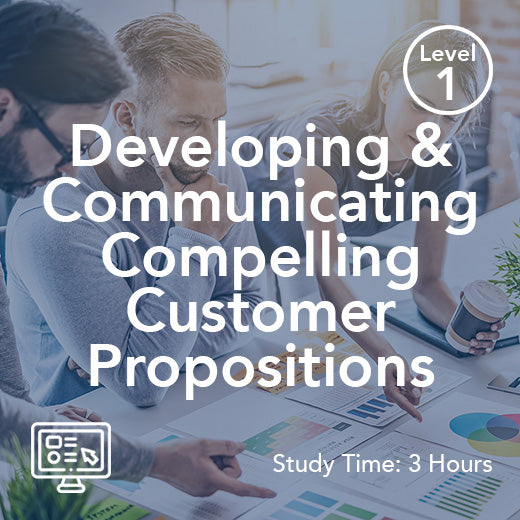
Developing and Communicating Compelling Customer Propositions (On-Demand)
For businesses to be successful, they need to align with their customers’ requirements in a number of key ways - but fundamentally it comes down to understanding the customer(s), creating compelling customer propositions, communicating those propositions, and enabling the value exchange. It encompasses product development, marketing and marketing communications, and business development / sales activities. This programme looks at the customer proposition holistically. It covers all the key elements needed to develop a sustainable business model that is tightly aligned with customer requirements, gets the right information in front of the right customers in an engaging and compelling way, and supports the overall strategy by delivering sustainable competitive advantage. We use exercises, case studies, break-outs and discussions to develop competencies and confidence, and the tools used will allow participants to apply the techniques to the workplace immediately. Topic Areas Include: Creating Compelling Customer Propositions Customers – Making Critical Choices Strategy and the Customer Proposition Customer Segments Products Brand Components of a Brand Pricing Expectation and Consistency The 80/20 Golden Rule Sales and Business Development Linking Marketing and sales – Lead Generation Sales – Common Objections Overcoming Common Objections Establishing a Sales Decision Process Responding to RFPs Telecoms Business Simulation Communicating Compelling Customer Propositions Channels to Market Key Elements of the Marketing Message The Psychology of Persuasion Segments, Profiles, Emotion Marketing Communications Online Marketing Marketing Systems and Frameworks Customer Retention and Loyalty Marketing Communications Plan Developing a Marketing Communications Plan Developing a Campaign for Lead Generation / Sales Assessing the Marketing and Communications Plan - KPIs International Marketing Market Research Marketing Resource
£95.00
-
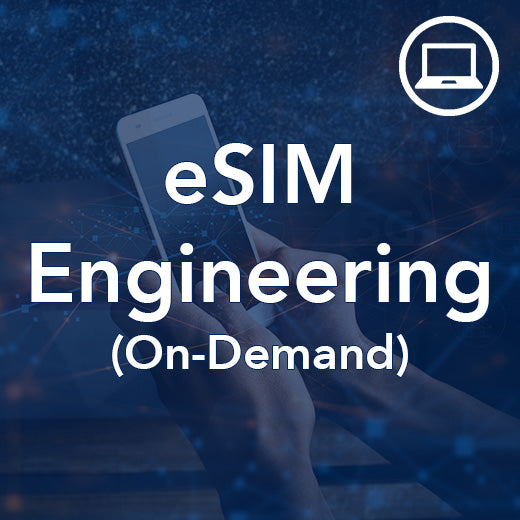
eSIM Engineering (On-Demand)
The eSIM Engineering Training Course offered by Wray Castle provides a comprehensive technical overview of eSIM technology and the latest remote SIM provisioning specifications from GSMA. This course delves into the transition of the SIM from physical to digital realms, exploring unique system architectures for both M2M and Consumer applications. Participants will gain insights into the evolution of eSIM technology and a glimpse into the future developments in this field. Engineers, product managers, and other professionals seeking to implement eSIM-based products and services within their organizations will greatly benefit from this course. A general engineering background with some knowledge of GSM SIM technology is assumed, and a basic understanding of mobile networks would be advantageous. The course covers essential topics such as the introduction to eSIM, GSMA Consumer eSIM Specification, GSMA M2M eSIM Specification, enhancements in the Consumer eSIM Specification, and the future prospects of eSIM technology. This self-paced on-demand distance learning course features illustrated course books, videos, tests and full tutor support. Who would benefit The course is intended for engineers, product managers and other staff who are looking to prepare for or actively roll out eSIM-based products and services within their organisations. Prerequisites A general engineering background with some knowledge of GSM SIM technology is assumed. A basic understanding of mobile networks would be desirable. Topic Areas Include Introduction to eSIM GSMA Consumer eSIM Specification GSMA M2M eSIM Specification GSMA Consumer eSIM Specification Enhancements The Future of eSIM
£1,815.00
-
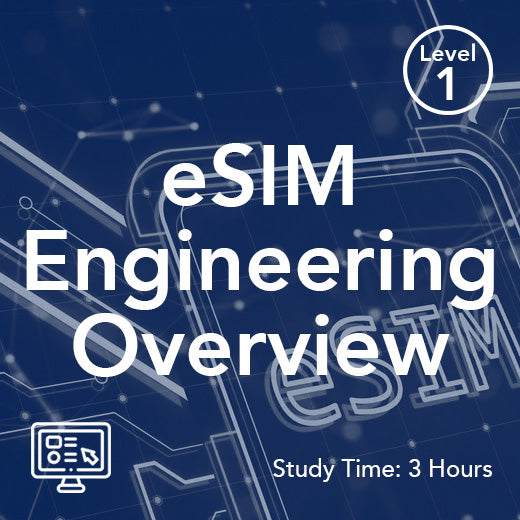
eSIM Engineering Overview (On-Demand)
Our eSIM Engineering Overview Training Course provides a comprehensive technical overview of eSIM technology and the latest remote SIM provisioning specifications from GSMA. This course delves into the role of the SIM, the transition from physical to digital, system architectures for both M2M and Consumer applications, the evolution of eSIM, and a glimpse into the future of this technology. Engineers, product managers, and other professionals seeking to implement eSIM-based products and services will benefit greatly from this course. Participants are expected to have a general engineering background with some knowledge of GSM SIM technology. While not mandatory, a basic understanding of mobile networks would be advantageous. The course covers essential topics such as Introduction to eSIM, GSMA Consumer eSIM Specification, GSMA M2M eSIM Specification, GSMA Consumer eSIM Specification Enhancements, and The Future of eSIM. This self-paced on-demand distance learning course features illustrated course books, videos, tests and full tutor support. Who would benefit The course is intended for engineers, product managers and other staff who are looking to prepare for or actively roll out eSIM-based products and services within their organisations. Prerequisites A general engineering background with some knowledge of GSM SIM technology is assumed. A basic understanding of mobile networks would be desirable. Topic Areas Include Introduction to eSIM GSMA Consumer eSIM Specification GSMA M2M eSIM Specification GSMA Consumer eSIM Specification Enhancements The Future of eSIM
£95.00
-

Essential 5G Protocols and Procedures (On-Demand Virtual Lab)
In this lab-based course, you will dive deep into the essential 5G protocols, with a specific focus on the 5G NF Framework, registration processes, and PDU session establishment. Through a series of interactive lab sessions, you'll gain invaluable experience and a comprehensive understanding of critical aspects of the 5G system.This course is tailored for individuals and organisations keen on mastering the operational intricacies of 5G systems. Whether you work for a public or private mobile network operator, network equipment vendor, test equipment vendor, handset manufacturer, regulator, or integrator, this course is universally relevant.This course is uniquely designed to be lab-based, ensuring that theoretical concepts are immediately put into practice. Through a series of interactive labs, participants will gain not only theoretical knowledge but also the practical skills necessary to navigate the dynamic world of 5G protocols and procedures. Course Structure Gain a comprehensive understanding of the 5G NF Framework, 5G registration and 5G PDU Session Establishment procedure’s including: 5G NF Registration Registration Message Flow Next Generation Application Protocol 5G AKA (Authentication and Key Agreement) Subscriber Data Handling AM (Access and Mobility) Policy Association 5G Session Establishment PFCP (Packet Forwarding Control) Protocol Who Would Benefit? The standardised nature of the lab makes it suitable for any organization interested in 5G System operation and function including. It is of particular interest to those in the following roles: Engineers working with Operation, Optimisation and Troubleshooting System Engineers and Integrators Or anyone who needs to explore and understand the 5G Core Network signalling Lab Features & Benefits Through a combination of hands-on experience and guided instruction our virtual labs allow users to explore signalling procedures in the 5G system. Our labs feature: A simulated 5G network - Provides hands-on experience and reinforces theoretical knowledge. Wireshark (pcap) output files – detailed output files provide deep system insight. Illustrated Course Books - featuring leading edge knowledge from subject matter experts. Videos - Detailed videos discuss topics in greater depth. Guided exercises for signalling scenarios - makes learning and applying new concepts straightforward. Ongoing trainer support - ensures you get expert advice when needed.
£1,140.00
-
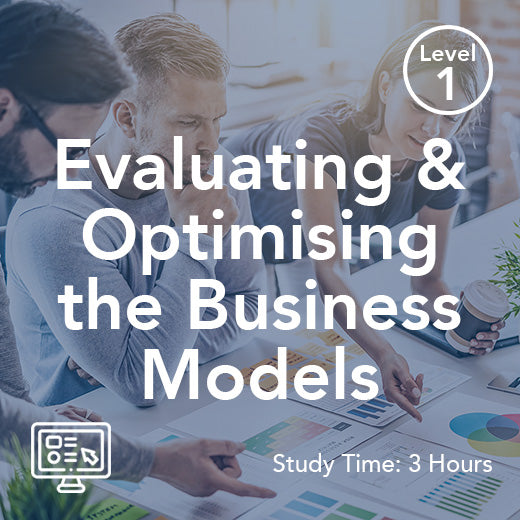
Evaluating and Optimising the Business Models (On-Demand)
Business models define a mix of activities required within a business to support a specific strategy. Collectively, one or more business models, aligned to a well-thought-out strategy, will deliver the competitive advantage needed to compete successfully in the market, and against any relevant competition. Business models are often complex, with multiple models running in parallel, and often in competition with each other within the business (in addition to the external competition). In this programme, we deconstruct the business model in order to fully understand its component parts before looking at how those parts can be optimally configured / reconfigured in order to maximise value creation and competitive advantage. We use examples, exercises and case studies to build a solid foundation that can be used within your own organisation to help drive success. Who Would Benefit? These programmes deliver comprehensive training for employees at all levels within the organisation. They would benefit employees, mid-senior managers, directors, specialists, consultants and identified talent. Topic Areas Include: Definitions and Components of a Business Model Business Model(s) – In the Bigger Picture Relationship - Strategy, Business Models and Operations Business Model Definition Understanding Value Extraction Developing The “Fit” of Activities – Examples Partnerships and the Business Model Customer Segments and Value Propositions Business Models – Options, Assessment and Development Understanding Value Business Model Disruption Business Model Adaptation Defining New Business Models Successful Examples for Redefined Business Models Business Models – The [Many] Options Explored
£95.00
-

Fundamentals of Telecommunications (On-Demand)
This course will cover a wide range of topics, starting with the basics of services and connectivity. It will provide insight into the evolution of telecommunication networks over time, reflecting on both historical advancements and future trends. We will begin with an introduction to the foundational aspects of telecom services and connectivity, setting the stage for more detailed explorations. We will then delve into fixed access technologies, starting with traditional copper pair connectivity and progressing through the evolutionary phases of fixed broadband access. This will include a thorough discussion of the technologies that have shaped and continue to influence fixed network landscapes. The mobile sector will receive a focused analysis beginning with the fundamental cellular concepts. We will explore the evolution of mobile broadband, especially under the frameworks established by the 3rd Generation Partnership Project (3GPP), covering technologies from GSM to advanced LTE and 5G networks. An essential component of this course will be a deep dive into operational support systems (OSS) and business support systems (BSS), which are critical for managing modern telecommunications services. We will examine the key platforms that support telecom services, such as billing, customer service, and network management systems. The course will also cover the burgeoning area of the Internet of Things (IoT), detailing how this technology integrates into existing telecom infrastructures and the new opportunities it creates. Additionally, we will consider the infrastructure backbone of the telecom industry, focusing on data centres and the relative costs associated with telecom infrastructure, excluding spectrum costs. Course Contents: Introduction Services and Connectivity - Evolution Fixed Access Mobile Access Support Systems Infrastructure
£95.00
-
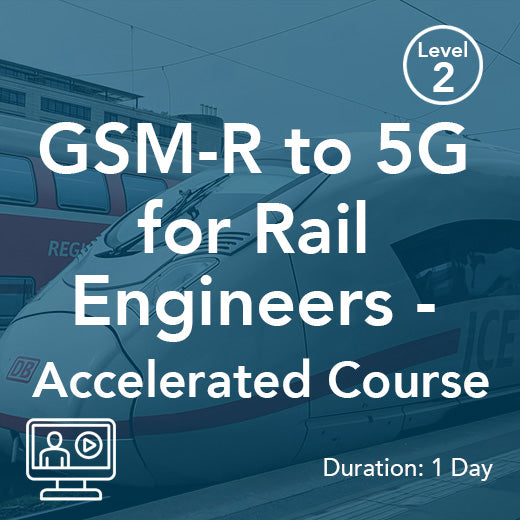
GSM-R to 5G for Rail Engineers – Accelerated Course (On-Demand)
This accelerated one-day course provides rail engineers and technical professionals with a clear understanding of the transition from GSM-R to the Future Railway Mobile Communication System (FRMCS). It explores the fundamental differences in architecture, services, spectrum, and radio technology, highlighting how FRMCS leverages 5G capabilities to deliver enhanced performance, security, and flexibility. Through structured comparisons, participants gain the knowledge needed to appreciate the opportunities and challenges of modernising railway communications and supporting the shift towards the digital railway. This self-paced on-demand distance learning course features illustrated course books, videos, tests and full tutor support. During the course you'll learn: The key technological differences between GSM-R and FRMCS. How network architectures, radio technologies, and addressing schemes compare. The changes in spectrum allocation and radio operation. How 5G technology introduces stronger security and new capabilities for critical railway applications. Who Would Benefit This course is designed for railway engineers, telecom specialists, project managers, and technical administrators who need a clear overview of how FRMCS builds on and differs from GSM-R. It will be particularly valuable for those involved in planning, deploying, or supporting the next generation of railway communication systems, as well as stakeholders who need to understand the operational and technical impacts of the transition to 5G-based FRMCS. Prerequisites A background in GSM-R or GSM would be advantageous. Course Modules Railway Communications Network Architecture Addressing Radio Technology Radio Spectrum Security GSM-R vs FRMCS
£1,336.00
-
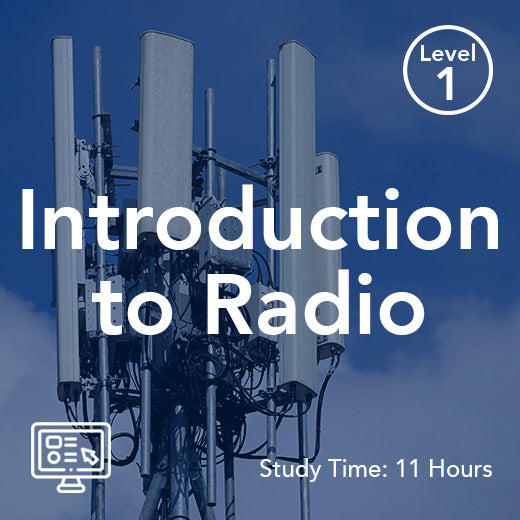
Introduction to Radio (On-Demand)
Expand your knowledge of radio technology with our Introduction to Radio Training Course. This short online self study course will provide you with a comprehensive understanding of how the radio spectrum is managed, the systems that utilize spectrum, and the technical aspects of radio system design. Whether you are a senior executive, manager, regulator, market analyst, or marketeer in the telecommunications industry, this course is designed to equip you with the knowledge and insights necessary to navigate the complexities of radio spectrum management. Our course covers a wide range of topic areas, including how radio spectrum is regulated, the concepts of bandwidth and channels, antenna characteristics, radio wave propagation mechanisms, and the impact of interference and noise. Additionally, you will gain an overview of various radio systems such as 2G, 3G, and 4G, and explore the factors driving the demand for spectrum. This course is tailored for individuals with no technical background, making it accessible to a diverse range of professionals seeking to enhance their understanding of radio technology. Join us for our Introduction to Radio Training Course and stay ahead of the curve in the ever-evolving world of radio technology. Gain valuable insights into the management and use of radio spectrum, align radio applications to frequency bands, and explore the latest advancements driving the demand for spectrum. Don't miss this opportunity to expand your knowledge and expertise in radio technology. This self-paced on-demand distance learning course features illustrated course books, videos, tests and full tutor support. Who would benefit Senior executives, managers, regulators, market analysts and marketeers involved in the telecommunications industry who require an understanding of the wide range of issues surrounding the use and management of radio spectrum. Prerequisites This course is designed for those with no technical background. Topic Areas Include How radio spectrum is managed and regulated How radio spectrum is used The concepts of bandwidth and channels An introduction to the characteristics of antennas Radio wave propagation mechanisms The impact of interference and noise Aligning radio applications to frequency bands Overview of radio systems – including 2G, 3G and 4G What is driving the demand for spectrum? Health and Safety issues
£500.00
-
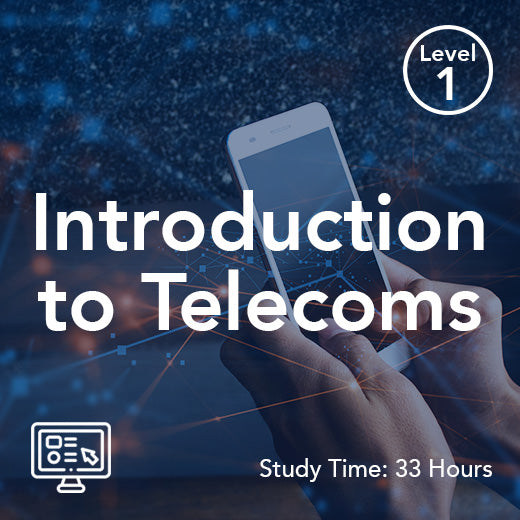
Introduction to Telecoms (On-Demand)
The Introduction to Telecoms Training Course is designed to provide participants with a comprehensive understanding of the core technologies used in fixed, mobile, and IP-based telecoms networks. Learners will delve into the fundamentals of networking technologies, including switching, transmission, and signalling, as well as the services that they support. The training also covers next-generation networking in an all-IP environment, ensuring that participants are equipped with the knowledge needed to excel in the telecommunications industry. Ideal for those currently working in or looking to enter the telecommunications field, this course is perfect for individuals who need a solid grasp of the functions and services offered by modern networks. Participants should have a basic mathematical ability and a technical aptitude, with the intention to pursue a technical role in the industry. By exploring topics such as telecoms evolution, network components and services, and mobile cellular systems, attendees will gain valuable insights into the ever-evolving world of telecommunications. This self-paced on-demand distance learning course features illustrated course books, videos, tests and full tutor support. Who would benefit Those working in or entering the telecommunications industry who need to understand the functions and services provided by modern networks. Prerequisites Mathematical ability and aptitude for technical subjects, with the intention to progress in a technical role. Topic Areas Include Telecoms evolution Network components and services The PSTN and ISDN: access and core networks Basic analogue and digital information concepts Time division multiplexing and switching techniques Transmission systems: PDH, SDH, WDM and OTN Mobile cellular systems: 2G, 2.5G, 3G and 3.5G Packet-switched techniques IP, Ethernet, the Internet, ISPs and Internet Services Fixed and Mobile Broadband access technologies Next Generation fixed and mobile networks IP Multimedia Subsystem Also available as a Live Online Training Programme, learn more.
£2,660.00
-
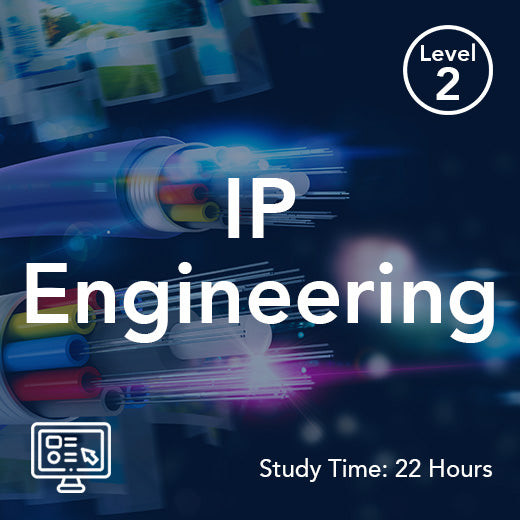
IP Engineering (On-Demand)
This comprehensive IP Engineering on Demand course provides a deep dive into Internet Protocol networks, covering engineering techniques, applications, protocols, and switching methods. Participants will gain the knowledge and skills needed to confidently navigate the IP environment, with topics including QoS, security, VPNs, and Multimedia over IP. Ideal for those looking to understand how IP networks are designed and implemented, this course is perfect for individuals seeking to enhance their expertise in this critical area. Participants in this course should have some prior knowledge or experience with packet-switched data network operation and Internet technology. The course covers a range of topic areas, including the background of the Internet and ISPs, the Data Link, IP, Transport, and Application layers, IPv6, DNS, MPLS, access services, routing in IP networks, OSPF, BGP4, IP QoS technologies, security engineering, IP VPNs, and IP multimedia services. By the end of the 22-hour course, participants will have a solid understanding of IP networks and the skills to work effectively in this dynamic environment. Who would benefit Those needing to understand how IP networks are designed and implemented. Prerequisites Some knowledge or experience of packet-switched data network operation and Internet technology is beneficial. Topic Areas Include: Background to the Internet and ISPs The Data Link, IP, Transport and Application layers IPv6 The Domain Name System (DNS) Introduction to MPLS Access services E-mail services and web hosting Name servers and heterogeneous networks Peering Routing in IP networks Overview of OSPF and BGP4 IP QoS technologies Security engineering IP VPNs IP multimedia services
£750.00
-

Leadership in Business (On-Demand)
Being an effective leader is difficult. Some in leadership positions struggle with the basics, others have huge gaps in their understanding, and many restrict themselves to management activities - actively avoiding actual leadership wherever possible. In most cases, the confidence to lead effectively is in short supply, and those that do have the confidence often confuse dominance, or power, with leadership. However, organisations who see good leadership and culture as THE key enablers for their people, are the ones most likely to thrive and prosper – in whatever field they are operating in. This comprehensive programme builds a solid understanding of leadership and culture in business, giving current and aspiring leaders the confidence and tools needed to better engage, guide, develop, coach, organise, assess, and most critically, empower their people, teams and departments. We develop a deep understanding of leadership, including all key aspects related to ourselves as an effective leader; understanding and engaging with our people; developing successful teams; and influence as a primary foundation. We follow this by an extensive look at how we can successfully support and deploy our people whilst building a balanced culture that maximises success, enables innovation, and drives engagement at every level. Exercises, discussions, break-outs, case studies and examples are used throughout in order to maximise learning, build confidence, and establish the foundations for successful leadership. Topics Covered Include Leadership in Business / Organisations Developing Effective Teams Influence and Communication Supporting and Deploying Effective People – Culture and Innovation
£95.00
-
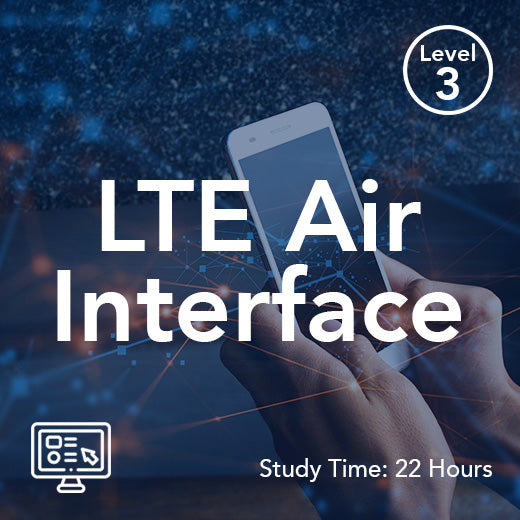
LTE Air Interface (On-Demand)
Our LTE Air Interface Training Course is designed to provide a comprehensive understanding of the air interface for LTE radio access. This course covers OFDMA principles, access and non-access stratum protocols, channel structures, connectivity and mobility management procedures, as well as radio link control functions. Engineers involved in equipment design, operation, optimization, or monitoring of the LTE radio link will benefit greatly from this training. Participants are expected to have an engineering background with some knowledge of digital radio systems and general radio principles and techniques. A basic understanding of LTE and experience with 2G or 3G systems would also be beneficial. Topics covered in the course include LTE system architecture, E-UTRAN architecture and interfaces, OFDMA/SC-FDMA basic principles, MIMO concepts and implementation, physical layer structures, access and non-access stratum protocols, and more. Enhance your knowledge and skills in LTE radio access and stay ahead in the rapidly evolving telecommunications industry. This self-paced on-demand distance learning course features illustrated course books, videos, tests and full tutor support. Who would benefit Engineers involved with equipment design, operation, optimization or monitoring of the LTE radio link. Prerequisites An engineering background with some knowledge of digital radio systems and general radio principles and techniques is assumed. A basic understanding of LTE and experience of 2G or 3G systems would be beneficial. Topic Areas Include LTE system architecture E-UTRAN architecture and interfaces OFDMA/SC-FDMA basic principles Defining orthogonality OFDMA features and benefits The Fourier transform OFDMA/SC-FDMA transmitter and receiver chains Modulation and coding, MIMO and the Cyclic Prefix MIMO concepts and implementation Physical layer structures Access and non-access stratum protocols Logical, Transport and Physical channels RRC, PDCP, MAC and RLC functions Resource allocation and scheduling strategies LTE-Advanced concepts Lower layer procedures Connection establishment Radio resource management procedures
£950.00
-
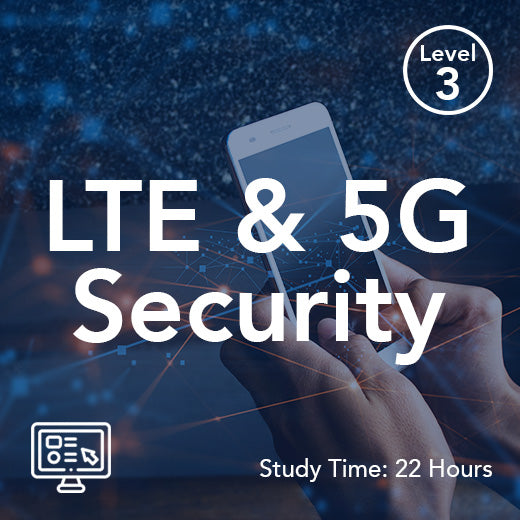
LTE and 5G Security (On-Demand)
LTE and 5G systems play a crucial role in our modern communication landscape, with the potential to revolutionize how we connect and interact with our devices. As these technologies become more prevalent, ensuring the security of our data and privacy becomes paramount. The LTE and 5G Security On-Demand Training Course offered by Wray Castle provides a comprehensive overview of the security measures implemented in LTE and 5G networks, covering key aspects such as authentication, key agreement, and network security protocols. This self-paced distance learning course delves into the intricacies of LTE and 5G security architectures, exploring the evolution from LTE to 5G and the security enhancements introduced in the latest generation of cellular networks. Participants will gain a deep understanding of the security procedures and key derivation methods used in both Non-standalone and Standalone Modes of 5G networks, as well as the authentication and interworking protocols involved in ensuring a secure communication environment. Designed for engineers, managers, and technical professionals working in the telecommunications industry, this course is also beneficial for individuals looking to broaden their knowledge of LTE and 5G security protocols. Whether you are new to the field or have prior experience in telecoms, this training course will equip you with the essential skills and insights needed to navigate the complex security challenges posed by LTE and 5G networks. This self-paced on-demand distance learning course features illustrated course books, videos, tests and full tutor support. Who would benefit This course is designed for engineers, managers and other personnel who have a need to acquire a technical overview of the security environment employed within LTE and 5G networks. It will also be of benefit to those in the wider technical community who have a need to understand the security protocols employed by cellular networks. Prerequisites Attendance on, or equivalent knowledge, LTE Engineering or 5G Engineering would be useful. Alternatively, experience working in this area of telecoms. Topic Areas Include LTE Security Architecture Authentication and Key Agreement Evolution to 5G 5G Non-Standalone Mode Security 5G Standalone Mode Security
£750.00
-
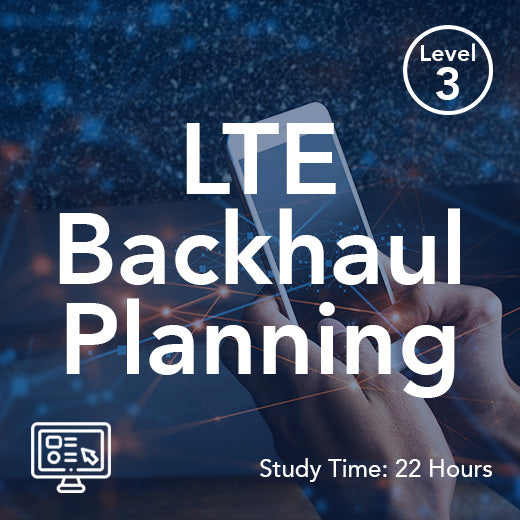
LTE Backhaul Planning (On-Demand)
This course provides a detailed overview of the issues related to the planning of backhaul services designed to support 4G LTE Cellular sites in both dedicated and single Radio Access Network (RAN) environments. The course focuses on planning techniques related to the most commonly-employed backhaul technologies used in conjunction with LTE, such as Ethernet, packet-based microwave and IP. It also covers aspects such as timing and security solutions and presents techniques that can be employed to estimate backhaul requirements and plan for suitable deployments. Join our LTE Backhaul Planning Training Course to gain a comprehensive understanding of the planning techniques and technologies essential for supporting 4G LTE Cellular sites. This course is designed for engineers working for network operators involved in the planning and implementation of RANs, specifically focusing on the backhaul region from the cell tower back to the core network. You will learn about backhaul technologies such as Ethernet, packet-based microwave, and IP, as well as timing and security solutions crucial for LTE deployments. Our 1-day course covers topics including backhaul overview, defining 4G backhaul requirements, transport network evolution, synchronization options, VLAN management, and more. By the end of the training, you will be equipped with the knowledge and skills to estimate backhaul requirements, plan suitable deployments, and ensure efficient backhaul solutions for 4G LTE networks. No specific prerequisites are required for this course, making it accessible to a wide range of professionals in the telecom industry. Sign up now to enhance your expertise in LTE backhaul planning and stay ahead in the rapidly evolving telecommunications sector. This course is delivered as a self-paced on-demand distance learning course and features illustrated course books, videos, tests and full tutor support. Who would benefit This course is designed for engineers working for network operators in the planning and implementation of RANs and in particular the backhaul region from the cell tower back to the core network and are looking at the options that exist to provide backhaul solutions suitable for 4G LTE networks. Prerequisites No specific prerequisites for this course although a good understanding of mobile networks and in particular the radio access part of 3GPP based networks. Topic Areas Include Backhaul overview Backhaul planning techniques Defining 4G backhaul requirements Backhaul technologies appropriate for 4G networks Transport network evolution Multi RAT and Multi Operator (MRMO) Synchronization options Cell throughput expectations Industry initiatives and forums Radio to transport QoS mapping VLAN management Backhaul traffic profile Backhaul QoS Planning exercise – cell throughput calculations On-Demand Online Training Our self-paced on-demand distance learning programmes are accessible on any computer, tablet or smartphone and allow you to study at a time and location that is convenient to you. Each course includes: Illustrated Course Books - featuring leading edge knowledge from subject matter experts. Videos - Detailed videos expand the points covered in the course books, discussing topics in greater depth. Tutor Support – Dedicated course tutors are available to answer any questions you might have throughout your studies. Formative Assessment - Modules include regular quizzes to support learning by testing your knowledge of the subject matter. Certification– Successfully complete the end of module tests to earn Digital Badges to demonstrate the depth of your knowledge of the topic. Included in Wray Castle Hub This course is also available as part of the Wray Castle Hub. An annual subscription delivers unlimited access to this course and over 500 hours of learning material consisting of 30+ Courses, 190+ Learning Modules, and 1,000+ Videos. Annual Subscription: £1400 (Most cost-effective option) Subscribe to Wray Castle Hub here
£500.00
-
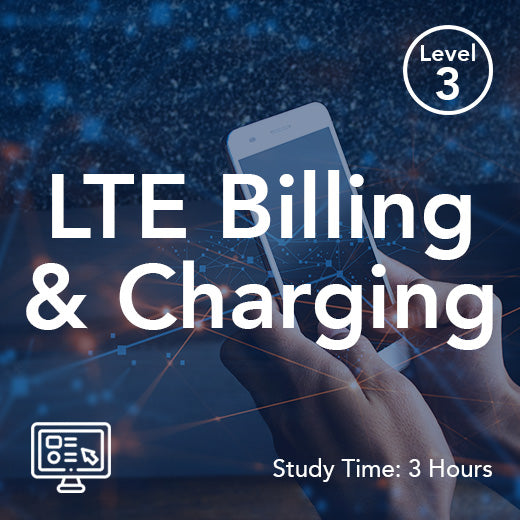
LTE Billing and Charging (On-Demand)
Our LTE Billing and Charging Training Course provides a comprehensive technical overview of the billing and charging architecture specifically designed for 4G LTE networks. Participants will gain insights into LTE bearer, traffic flow, and Quality of Service (QoS) concepts, as well as an in-depth understanding of the architecture of both online and offline billing systems. Key nodes, interfaces, and protocols used for transporting billing and charging information will be explored, along with the interactions with the billing system during basic LTE procedures. This course is ideal for engineers, designers, managers, and individuals involved in the development, deployment, or operation of LTE billing and charging systems. Familiarity with the LTE Evolved Packet Core is assumed, and experience with 2G or 3G billing systems would be beneficial. Topics covered include EPS bearer concepts, LTE QoS models, packet flows, deep packet inspection, policy and charging control, flow-based charging, billing architecture, charging data capture points, protocols (Diameter, CAP), interfaces (Gy, Gz, Rf, Ro), charging criteria, CDR formats, CDR generation, and charging interaction with basic LTE procedures. Join us for this informative and practical training session to enhance your knowledge and skills in LTE billing and charging. This self-paced on-demand distance learning course features illustrated course books, videos, tests and full tutor support. Who would benefit Engineers, designers, managers and others involved in the development, deployment or operation of LTE billing and charging systems. Prerequisites Familiarity with the LTE Evolved Packet Core is assumed. Experience of 2G or 3G billing systems would be beneficial. Topic Areas Include Review of EPS bearer concepts and LTE QoS models Packet flows, service data flows and traffic flow aggregates Deep packet inspection – heuristic algorithms and bearer-aware applications Outline of policy and charging control LTE billing and charging concepts Flow-based charging Billing architecture Online and offline charging systems Charging data capture points (S-GW, PDN-GW) IMS charging capture points Charging Data Function (CDF) Protocols – Diameter, CAP Interfaces – Gy, Gz, Rf, Ro and others Charging criteria – time-based, volume-based, application-based CDR formats CDR generation Charging interaction with basic LTE procedures
£95.00
-
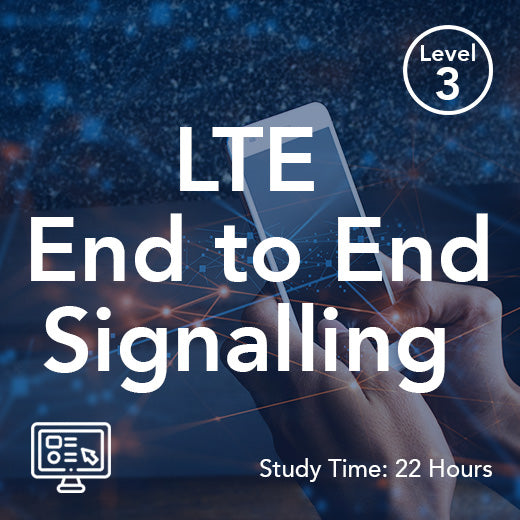
LTE End-to-End Signalling (On-Demand)
This course is designed to provide an end-to-end view of the whole set of signalling messages that support some of the most fundamental LTE network operations, such as: initial attach, PDN Connectivity, EPS Bearer setup, bearer resource allocation, handover and detach. Each procedure is presented in terms of the progression of signalling messages exchanged and each message is explored in detail. The course provides details of messages belonging to the following signalling protocols: RRC, NAS, S1AP, X2AP, GTPv2-C and also the Diameter S6a, S13 and Gx applications. Our LTE End-to-End Signalling Training Course (Course Code: LT1301) offers a comprehensive overview of the signalling messages involved in key LTE network operations. From initial attach to handover and detach procedures, participants will gain a deep understanding of the signalling protocols including RRC, NAS, S1AP, X2AP, GTPv2-C, and Diameter S6a, S13, and Gx applications. This course is ideal for engineers, managers, and personnel seeking a technical overview of the complete LTE signalling environment, providing valuable insights into the management of fundamental LTE procedures. Participants in this course will benefit from a detailed exploration of air interface signalling protocols, E-UTRAN signalling protocols, and EPC signalling protocols. Topics covered include initial attach procedures, idle mode procedures, connected mode procedures, handover procedures, and detach procedures. Prerequisites include a basic understanding of LTE network architecture, services, and protocols, which can be acquired through our LTE Engineering Overview and LTE Evolved Packet Core Network (LT3604) courses. An understanding of IP would also be beneficial for participants. Gain the knowledge and skills needed to navigate the complexities of LTE signalling protocols and procedure This self-paced on-demand distance learning course features illustrated course books, videos, tests and full tutor support. Who would benefit This course is designed for engineers, managers and other personnel who have a need to acquire a technical overview of the total LTE signalling environment (not just signalling in one part of the network) and also those that require an end-to-end view of the management of fundamental LTE procedures. Prerequisites A basic understanding of LTE network architecture, services and protocols, which can be gained from attending the LTE Engineering Overview (LT3600) and LTE Evolved Packet Core Network (LT3604) courses. An understanding of IP would be beneficial. Topic Areas Include Air interface signalling protocols E-UTRAN signalling protocols EPC signalling protocols Initial attach procedures Idle mode procedures S1 release Tracking area update procedure Service request procedure with ISR enabled Extended service request for CS fallback Connected mode procedures Connection establishment, modification and release Bearer resource allocation triggering dedicated EPS bearer establishment Bearer resource modification triggering EPS bearer modification PDN connectivity request Handover procedures X2-based handover with direct forwarding S1-based handover with S-GW change with indirect forwarding Inter-System PS handover to UMTS/HSPA without forwarding Detach procedures
£750.00
-
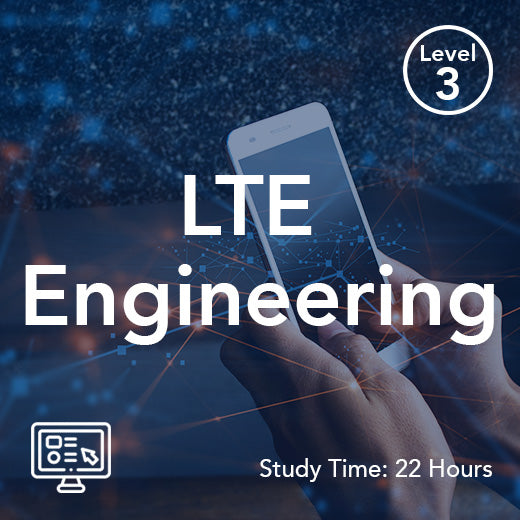
LTE Engineering (On-Demand)
A technical introduction and overview of LTE and LTE-Advanced, including the air interface, radio access network, core network and other key associated technologies. This self-paced on-demand distance learning course features illustrated course books, videos, tests and full tutor support. Who would benefit This course is intended for engineers either new to, or already working in, mobile communications. Prerequisites Familiarity with telecommunications and general engineering terminology is assumed and some understanding of 2G and 3G cellular systems would be beneficial. Topic Areas Include High level architecture of LTE Basic principles of OFDMA and SC-FDMA Air interface protocol stack Structure of the air interface physical layer E-UTRAN architecture, interfaces and protocols EPC architecture, interfaces and protocols LTE state diagrams Principles of bearers and Quality of Service (QoS) Voice options for LTE Power-on procedures UE procedures in idle and connected modes Enhancements in LTE-Advanced
£750.00
-
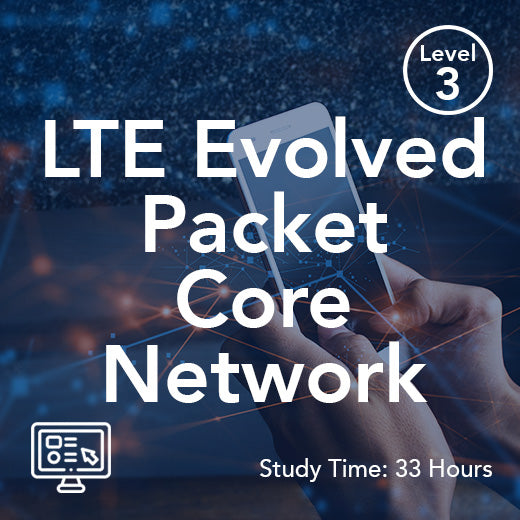
LTE Evolved Packet Core Network (On-Demand)
Our LTE Evolved Packet Core Network Training Course is designed to provide a comprehensive technical understanding of the Evolved Packet Core (EPC) for LTE systems. In this course, participants will learn about EPC architecture, interfaces, service provision concepts, application of IP technologies, overall protocol architectures, and optionally, a review of IMS functionality Engineers and other staff involved with switching or transmission architecture, optimization, network management, network testing, or monitoring of the EPC would greatly benefit from this training. Participants are expected to have an engineering background with some knowledge of core network technologies, including IP. Experience with 2G or 3G systems would also be beneficial for a better understanding of the course material. The course covers a wide range of topic areas, including the high-level architecture of LTE, functions of key EPC components like MME, S-GW, PDN-GW, HSS, and PCRF, LTE state diagrams, inter-operation with 2G, 3G, and non-3GPP networks, voice options for LTE, principles of bearers and Quality of Service (QoS), data transport in the EPC, policy and charging control architecture, IETF and 3GPP protocols in the EPC, power-on procedures, UE procedures in idle and connected modes, enhancements in LTE-Advanced, and optionally, an overview of the functions and architecture of the IMS. This self-paced on-demand distance learning course features illustrated course books, videos, tests and full tutor support. Who would benefit Engineers and other staff involved with switching or transmission architecture, optimization, network management, network testing or monitoring of the EPC. Prerequisites An engineering background with some knowledge of core network technologies, including IP, is assumed. Experience of 2G or 3G systems would be beneficial. Topic Areas Include High level architecture of LTE Functions of the MME, S-GW, PDN-GW, HSS and PCRF LTE state diagrams Inter-operation with 2G, 3G and non-3GPP networks Voice options for LTE Principles of bearers and Quality of Service (QoS) Data transport in the EPC Policy and charging control architecture IETF protocols in the EPC, including SCTP, DiffServ and Diameter 3GPP protocols in the EPC, including GTP and S1-AP Power-on procedures UE procedures in idle and connected modes Enhancements in LTE-Advance
£950.00
-
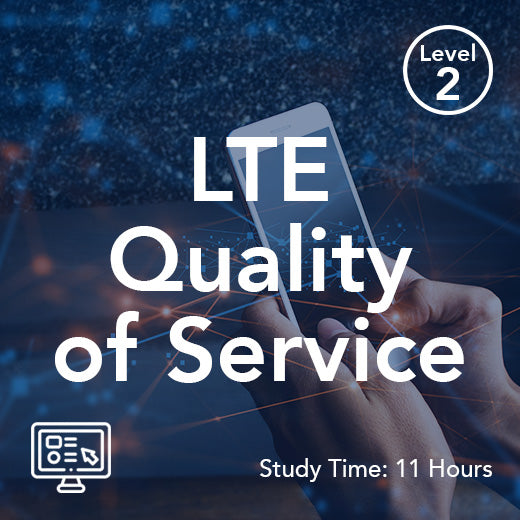
LTE Quality of Service (On-Demand)
Our LTE Quality of Service training course is designed to provide a comprehensive understanding of the key concepts and principles behind Quality of Service (QoS) in LTE networks. This course delves into the End-to-End EPS Bearer and the underlying Transport Network Layer (TNL) where QoS is crucially applied. Participants will explore the main QoS concepts and learn about the interworking between LTE QoS and other network types such as UMTS, GPRS, and IMS.This course is ideal for engineering and technical management professionals who need a technical overview of the technologies and techniques utilized by 4G LTE networks to define and control the QoS for user connections. Participants are expected to have an engineering background with some knowledge of telecommunications technologies and protocols. Previous LTE training and familiarity with QoS mechanisms in legacy 2G and 3G networks would be beneficial.By enrolling in this course, you will gain insights into topics such as E-UTRAN architecture and interfaces, EPS Bearer and PDN Connectivity options, LTE QoS parameters, QCI, ARP, QoS Management, LTE PCC mechanisms, TNL concepts, DiffServ, MPLS, Ethernet QoS, and much more. Enhance your knowledge and skills in LTE QoS with our expert-led training course. This self-paced on-demand distance learning course features illustrated course books, videos, tests and full tutor support. Who would benefit This course is suitable for engineering and technical management staff who require a technical overview of the technologies and techniques employed by 4G LTE networks to define and control the QoS applied to user connections. Prerequisites An engineering background with some knowledge of telecommunications technologies and protocols is assumed and previous LTE training would be beneficial, as would knowledge of QoS mechanisms in legacy 2G and 3G networks. Topic Areas Include E-UTRAN architecture and interfaces EPS Bearer and PDN Connectivity options and operations User plane connection concepts, packet flows, SDFs and Traffic Flow Aggregates LTE QoS parameters, QCI, ARP QoS parameter representation in LTE signalling protocols QoS Management – TFTs and packet filters LTE PCC (Policy and Charging Control) mechanisms PCC Rules, function and structure Interaction between PCC elements and internal and external network nodes Mapping LTE QoS to legacy network schemes Measuring QoS TNL concepts, architecture and QoS mechanisms DiffServ, MPLS and Ethernet QoS End-to-End QoS Architecture and Operation Network node QoS functions QoS influence on LTE handovers
£500.00
-
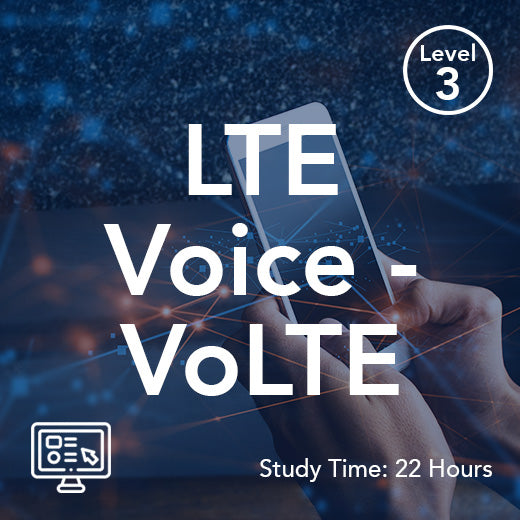
LTE Voice - VoLTE (On-Demand)
Our LTE Voice (VoLTE) training course is designed to provide a comprehensive technical understanding of how VoIP services are delivered using LTE and the IP Multimedia Subsystem. This course is ideal for engineering and technical management professionals looking to gain in-depth knowledge of the options available in LTE for delivering voice and real-time traffic through VoIP. Topics covered in this course include a technical overview of LTE, introduction to LTE voice options, IP Multimedia Subsystem (IMS) overview, Voice over LTE (VoLTE) system architecture, VoLTE protocols, services, and codecs, VoLTE call setup procedures, SRVCC, SMS delivery over IMS, VoLTE emergency calls, and Voice over Wi-Fi. This self-paced on-demand distance learning course features illustrated course books, videos, tests and full tutor support. Who would benefit This course is suitable for engineering and technical management staff who require a technical description of the options that exist in LTE for delivering voice and other real-time traffic types by means of VoIP. Prerequisites Attendance on this course assumes previous attendance on the LTE Engineering Overview course (LT3600) or equivalent basic LTE knowledge (although a recap of basic LTE architecture and concepts is provided at the start of the course) and also assumes a working knowledge of IP. Topic Areas Include Technical overview of LTE Introduction to the options for LTE voice Technical overview of the IP Multimedia Subsystem (IMS) System architecture for Voice over LTE (VoLTE) VoLTE protocols, services and codecs VoLTE power-on and registration procedures VoLTE call setup procedures Access domain selection Single Radio Voice Call Continuity (SRVCC) Delivery of SMS messages over the IMS VoLTE emergency calls Voice over Wi-Fi
£750.00
-

Machine Type Communications for LTE (On-Demand)
Mobile communication systems were originally designed to support voice (with SMS), but then focused primarily on developing data connectivity. With broadband connectivity representing the major areas of opportunity, networks were standardised, deployed and optimised to fully support that [fairly narrow] set of use cases. More recently, machine to machine communication, the Internet of Things (IoT) and connected innovation have seen massive growth, and become a much bigger part of the communications industry. However, the data connectivity requirements are very different to that of broadband. In order to optimally support this type of data, a number of modifications, new features, and complimentary technologies have been introduced to the networks. In LTE, these are grouped under the term Machine Type Communications (MTC). This course explores the technical aspects of MTC for LTE, and includes an examination of NB-IoT (Narrowband IoT) as a complimentary technology. Initially, the course provides an overview of IoT and low power networking / connectivity systems, and highlights the role and requirements of LTE for MTC. We then look at the features and performance of the different categories of MTC UE (User Equipment), the Air Interface modifications and features, and the Cellular IoT (C-IoT) enhancements to the Evolved Packet Core (EPC). Course Modules Introduction to LTE and the Internet of Things (IoT) LTE Technologies for the IoT NB-IoT and IoT Core Network Enhancements
£95.00
-
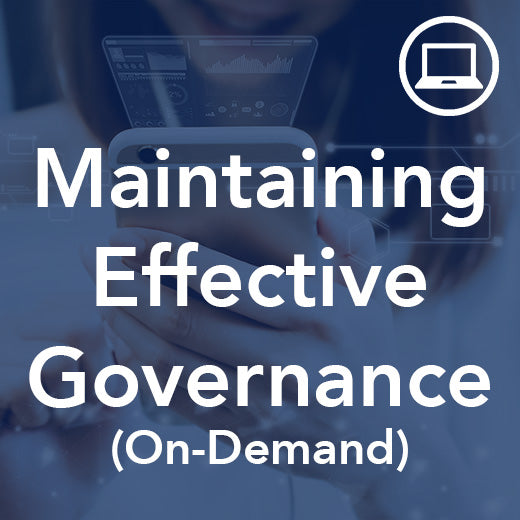
Maintaining Effective Governance (On-Demand)
Course Code LB06 Course Summary The business world is ever-changing, with focus shifting constantly as industries develop and evolve. Increasing requirement for good governance, however, has been a constant focus over a number of decades now. Companies that embrace good governance as part of their core value-system are invariably in a much better position as they scale, or as they expand /evolve their operating footprint to embrace new sectors or geographies. At its most effective, good governance, is felt throughout the organisation – with shareholders, employees and customers all more likely to engage in a positive and engaging way as the organisation develops. At its worst, bad governance directly contributes to dangerous working conditions or environmental disaster – and very likely, costly lawsuits, and competitive disadvantage. This short module is designed to complement our other business programmes by exploring key aspects of governance and what it all means for businesses. Comprehensive discussions and examples are used to illustrate the wide and varied topics covered, the critical focus areas within each topic, and how progressive governance can be used to positively impact, not only the business, but wider society. Prerequisites None Topics Covered include: Health and Safety Data Protection Ethical Financial Reporting Employment Practices Charity / Social Engagement Environment and Sustainability Aligning with the UN Sustainable Development Goals Consequential Thinking – The Four-Way Test Sustainability – Example Approached On-Demand Online Training Our self-paced on-demand distance learning programmes are accessible on any computer, tablet or smartphone and allow you to study at a time and location that is convenient to you. Each course includes: Illustrated Course Books - featuring leading edge knowledge from subject matter experts. Videos - Detailed videos expand the points covered in the course books, discussing topics in greater depth. Tutor Support – Dedicated course tutors are available to answer any questions you might have throughout your studies. Formative Assessment - Modules include regular quizzes to support learning by testing your knowledge of the subject matter. Certification– Successfully complete the end of module tests to earn Digital Badges to demonstrate the depth of your knowledge of the topic.
£95.00
-
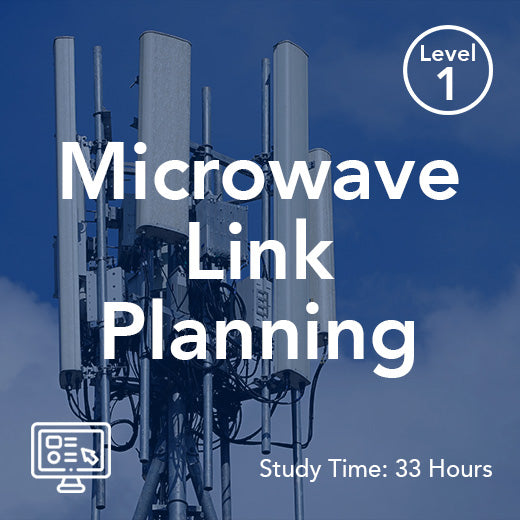
Microwave Link Planning (On-Demand)
The course covers all of the essential aspects of planning point-to-point microwave link systems, from conception to commissioning. Who would benefit Those involved in the specification, planning and maintenance of fixed microwave radio transmission, backhaul and access links. Prerequisites A good knowledge of radio principles, or a background in telecommunications engineering, or attendance on the Radio Principles course (RP1301). Topic Areas Include ITU-R and CEPT recommendations ETSI standards Spectrum management and channel plans Frequency assignment Digital radio performance characteristics Noise and interference in radio systems Reliability, availability and performance objectives Microwave antennas and feeders Radiation Pattern Envelopes (RPEs) Refraction, k-factor, reflection and diffraction Path profiling and Fresnel zone clearance Power budgets Rain and Multipath/Dispersive fade margins Dimensioning space and frequency diversity Interference management Practical link planning exercises Practical exercises, including design of a fixed link transmission network. On-Demand Online Training Our self-paced on-demand distance learning programmes are accessible on any computer, tablet or smartphone and allow you to study at a time and location that is convenient to you. Each course includes: Illustrated Course Books - featuring leading edge knowledge from subject matter experts. Videos - Detailed videos expand the points covered in the course books, discussing topics in greater depth. Tutor Support – Dedicated course tutors are available to answer any questions you might have throughout your studies. Formative Assessment - Modules include regular quizzes to support learning by testing your knowledge of the subject matter. Certification– Successfully complete the end of module tests to earn Digital Badges to demonstrate the depth of your knowledge of the topic. Also available as a Live Online Training, Learn more
£2,660.00





























































